





In an era marked by unprecedented technological advancements and complex societal challenges, the traditional paradigms of scientific research and knowledge dissemination are rapidly evolving. Open Science emerges as a beacon of innovation, embodying the principles of transparency, collaboration, and accessibility crucial for addressing the intricate problems facing our world today. At NMIMS Deemed-to-be -University along with the other project partners aim to pave the way for more inclusive and impactful scientific community that leverages the power of open collaboration and knowledge exchange.
Open -Asia: Boosting engagement of HEIS in Open Science in India and Malaysia Reference No 101128493 is funded by the ERASMUS + an European Union program that supports education, training, youth and sport in Europe and Central Board of Higher Education (CBHE). The vision of the project is to engage the open science approach i.e., a modern movement that plays a crucial role in supporting the growth of digital economy, enhancing connectivity, strengthening digital infrastructure, and shaping institutional policies by promoting transparency, collaboration and open access to scientific knowledge. The Open Asia project a three-year long project (2024-2026) implemented on 1st January 2024. Read More
Open Asia Grant: Sum of EUR 888,579 is Co-funded by ERASMUS+ of the European Union.

The project consortium consists of nine project partners from round the world – four from Europe and five from Asia. NMIMS Deemed-to-be -University is appointed as a lead coordinator of the Open - Asia project and EDPRI as a coordinator of the project. The other partner countries which include institutions from the following:
.jpg)
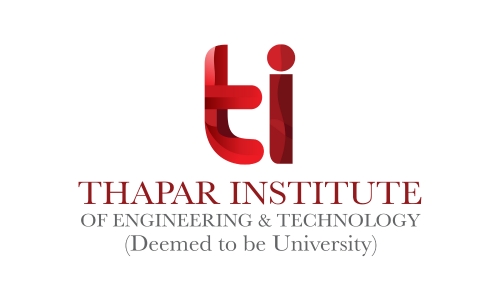
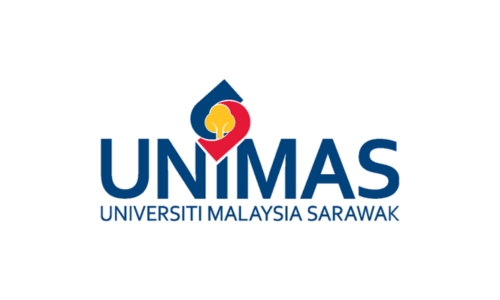


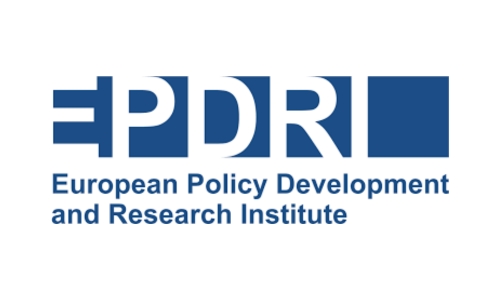

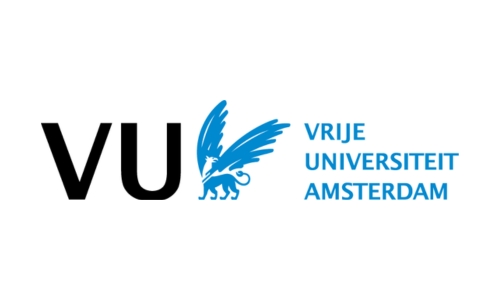
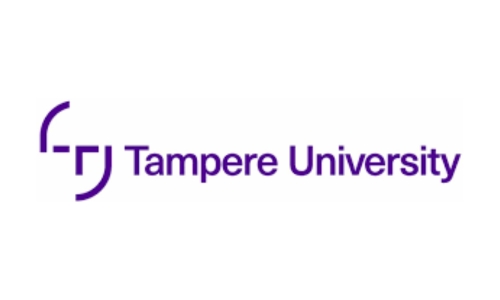

Chief Financial Officer

Pro Vice Chancellor

Pro Vice Chancellor
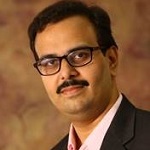
Dean- Sunandan Divatia School of Science (SDSOS)
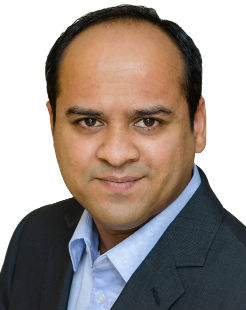
Associate Professor, Shobhaben Pratapbhai Patel School of Pharmacy & Technology Management (SPPSPTM)

Professor & Associate Dean – Research & Ph.D. Program, School of Business Management (SBM)
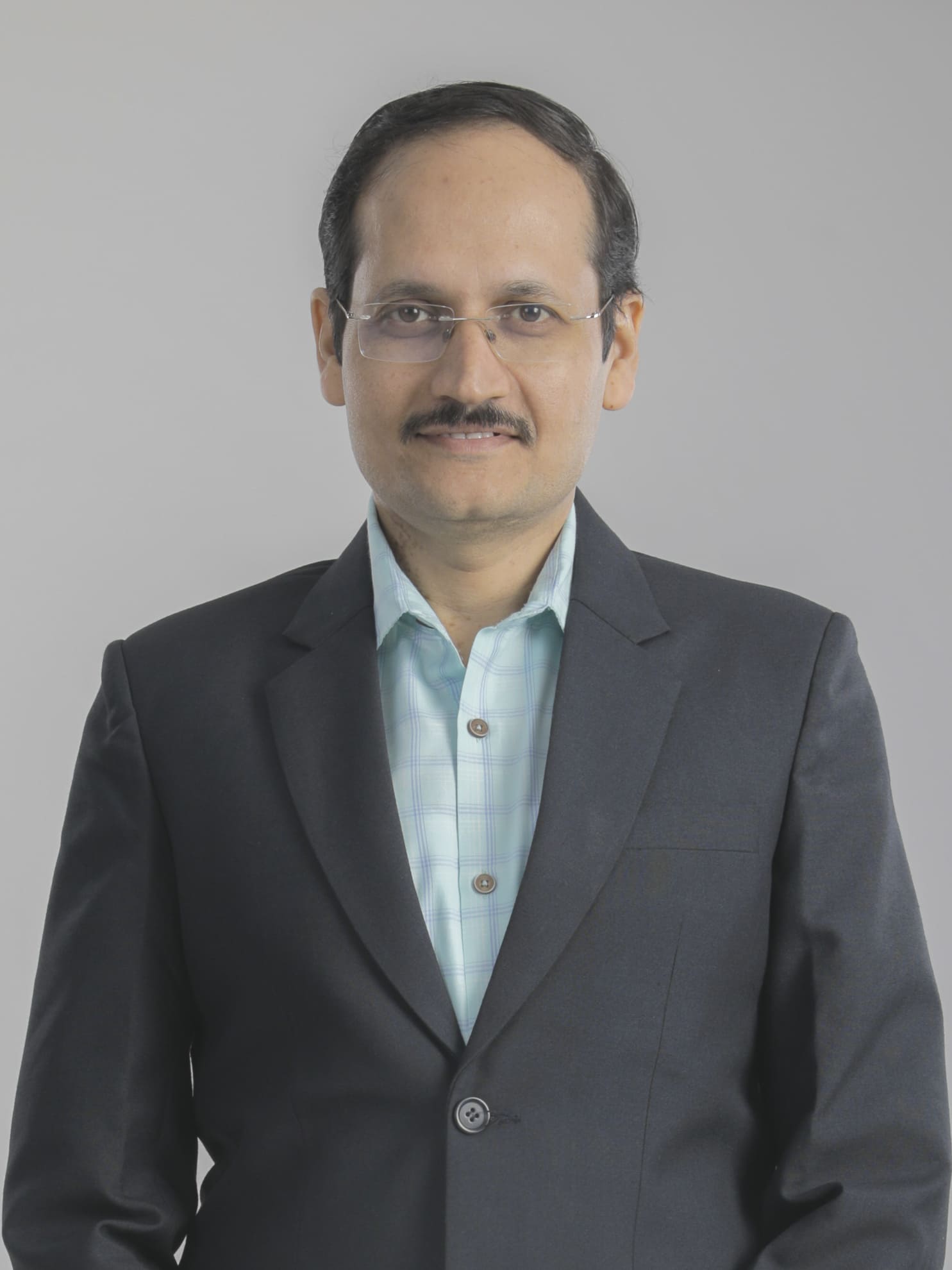
Professor & Head, Department of Computer Engineering, Mukesh Patel School of Technology Management & Engineering (MPSTME)
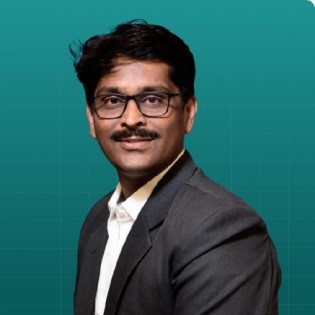
Assistant Professor, Sunandan Divatia School of Science (SDSOS)
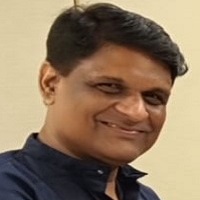
Librarian, NMIMS
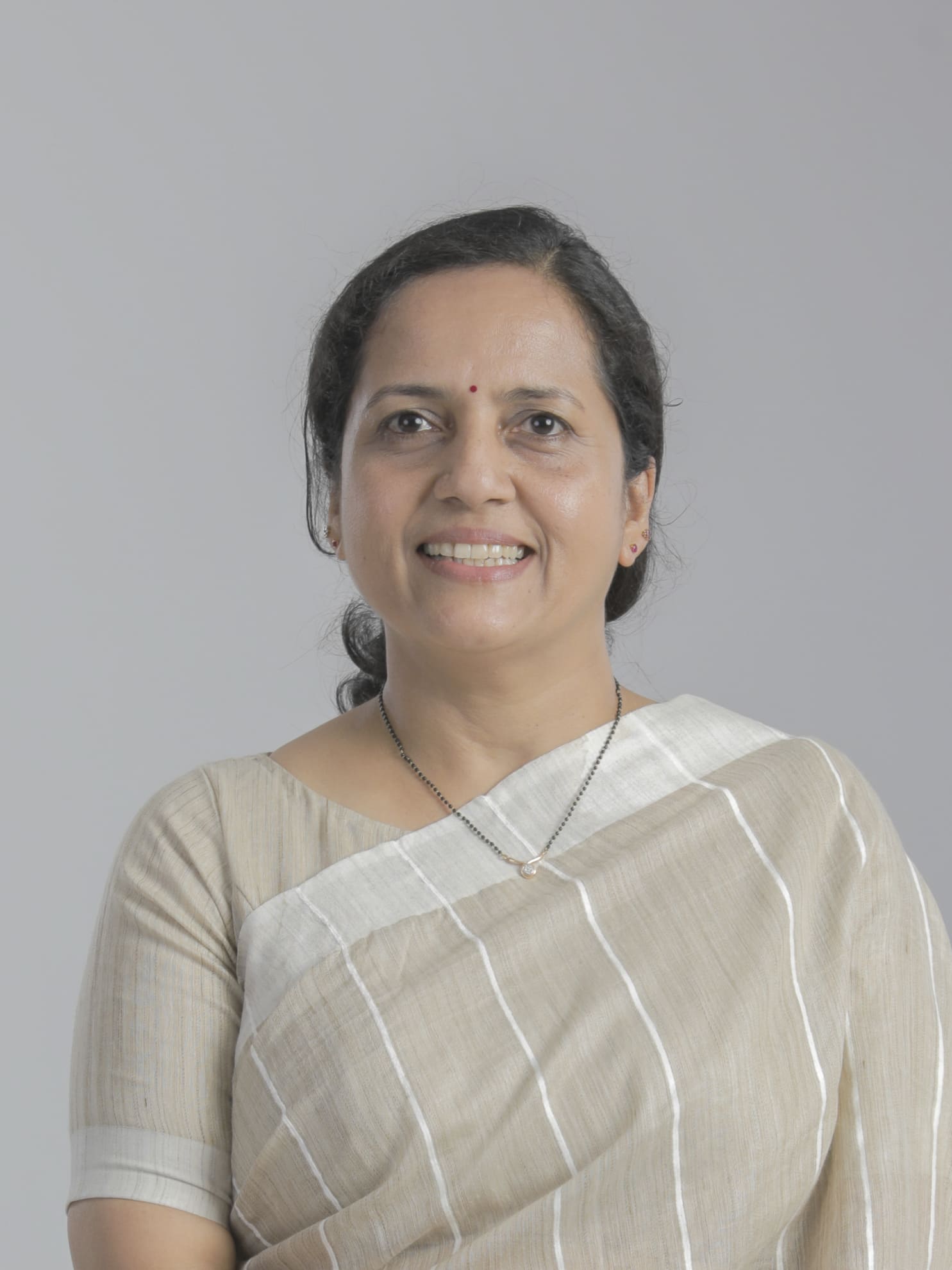
Associate Professor & Head, Department of Information Technology, Mukesh Patel School of Technology Management & Engineering (MPSTME)
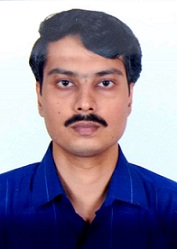
Associate Dean, Shobhaben Pratapbhai Patel School of Pharmacy & Technology Management (SPPSPTM)
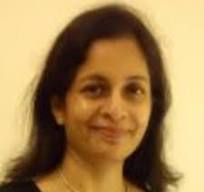
Associate Dean (R&D), Mukesh Patel School of Technology Management & Engineering (MPSTME)
Chief Accountant, SVKM
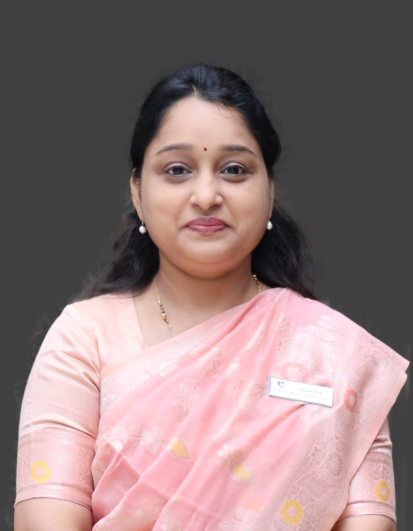
Manager, International Linkages
The objectives, of the OPEN-ASIA project, aim to tackle challenges faced by partners of higher educational institutions at national, institutional, and individual levels. This will elevate the competitiveness of higher education and research in India and Malaysia, enhancing their significance as poles of excellence and increasing standards in society.

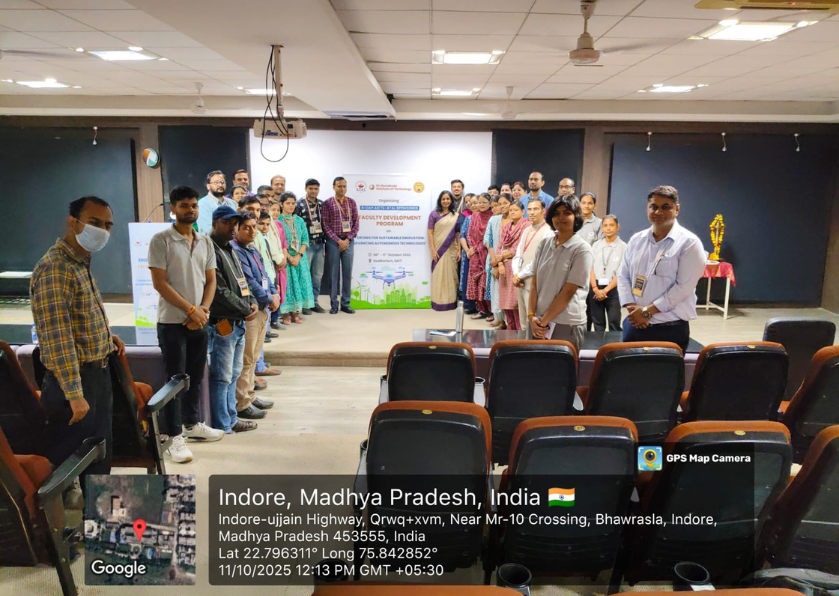
A one-week Faculty Development Programme was organized by Sri Aurobindo Institute of Technology, Indore, from 6th to 11th October 2025. As part of this initiative, Dr. Archana Bhise, Professor and Associate Dean (R&D), Mukesh Patel School of Technology Management & Engineering (MPSTME), SVKM’s NMIMS University, Mumbai, conducted a session on 11th October, 2025, on the topic “FAIR Principles in Research: A Backbone of Open Science.”
The session aimed to enhance participant’s understanding of the ethical and practical aspects of managing and sharing research data in line with global open science standards. Dr. Bhise emphasized how the ‘FAIR principles- Findable, Accessible, Interoperable, and Reusable’ form the foundation of transparent, trustworthy, and collaborative research.
She highlighted India’s commitment to Open Science through initiatives such as the
all aimed at enhancing the visibility and reusability of publicly funded research.
Dr. Bhise also addressed key ethical considerations including privacy, consent, equity, and responsible reuse, stressing that openness must balance transparency with ethical responsibility.
The session concluded with an overview of the ERASMUS+ Open Asia Project, funded under the Erasmus+ programme of the European Union (Grant No. 101128493) and coordinated by Universiti of Malaya, is a three-year initiative (2024-2026) aimed at boosting engagement of higher-education institutions in India and Malaysia with Open Science practices.
Through a consortium of nine partner institutions across Europe and Asia, the project supports institutional transition to sustainable Open Science models, development of open-science infrastructure and policy, capacity-building, and dissemination activities.
Overall, the session inspired participants to adopt FAIR principles in their research endeavours, fostering a culture of openness, collaboration, and ethical integrity.
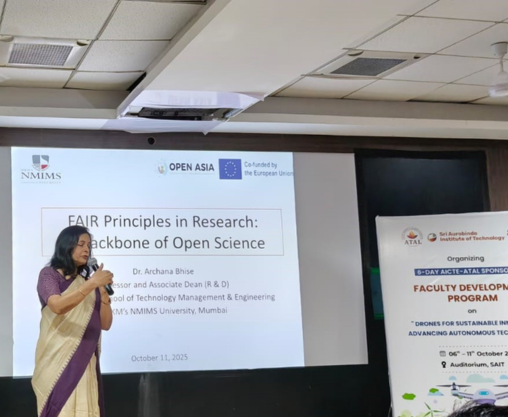
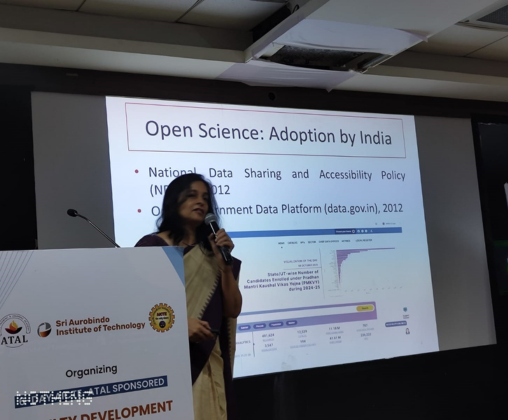
Date : 12th August 2025
Venue : NMIMS, Mumbai
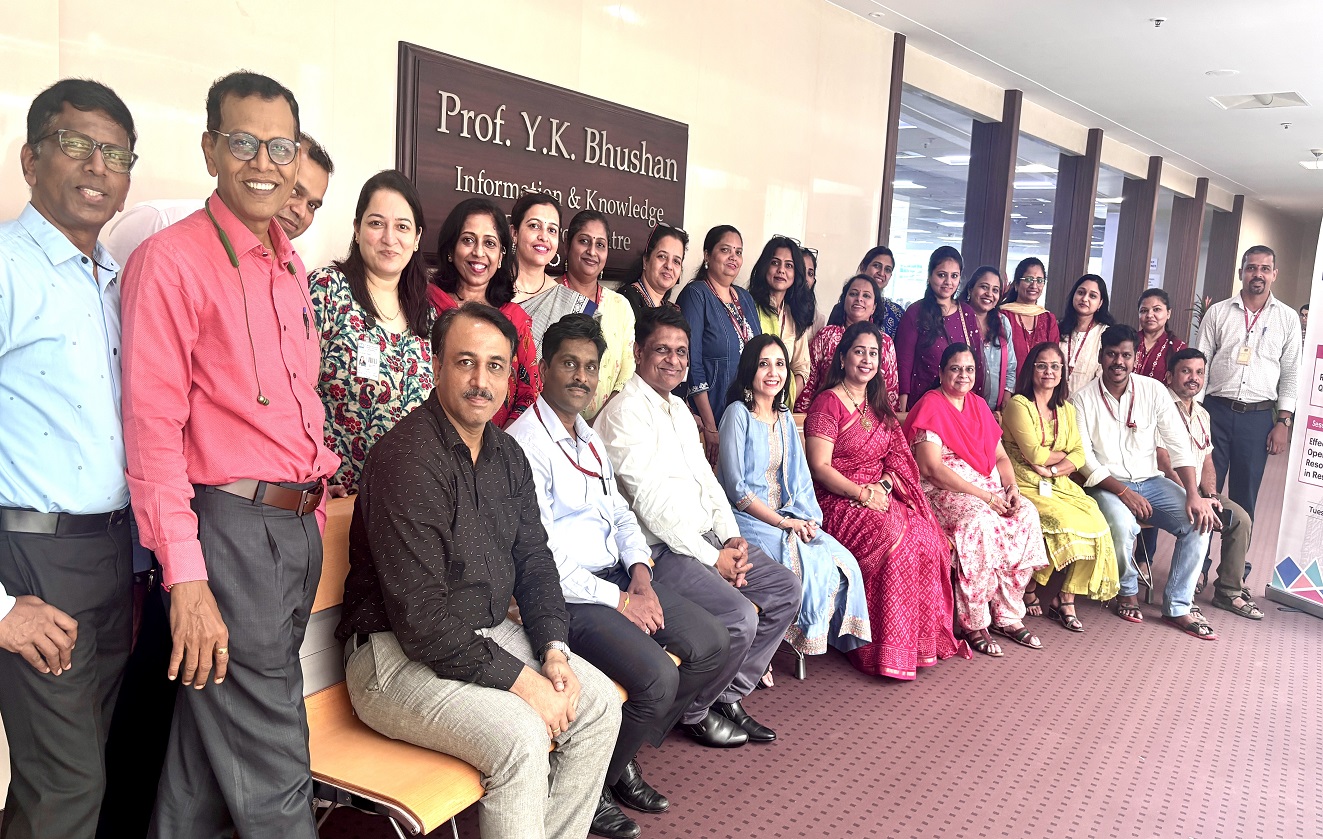
On 12th August 2025, NMIMS campuses across India celebrated National Librarians’ Day, commemorating the birth anniversary of Dr. S. R. Ranganathan, Father of Library Science in India. At the Mumbai Campus, the celebration was jointly organized under the ERASMUS+ and Open Asia Project, reaffirming NMIMS’s commitment to advancing open knowledge, research collaboration, and inclusive learning practices.
Agenda Highlights
Technical Sessions
Dr. Jinal Shah conducted an insightful session on “Research Writing for Quality Publications” highlighting the essential components of effective academic writing and strategies for publishing in reputed journals. The session emphasized the importance of research ethics, structuring manuscripts, selecting appropriate journals, and addressing reviewers’ comments. Participants gained practical tips to enhance the quality of their scholarly work, making the session highly valuable for emerging researchers and academicians.
As part of an Institutional Activity of the Open Asia Project (co-funded by ERASMUS+ of the European Union), NMIMS Mumbai hosted a session by Dr. Bajarang Kumbhar on the effective use of OERs in research. The session emphasized NMIMS’s contribution to the Open Asia vision by promoting open access, knowledge sharing, and collaborative research practices. Dr. Kumbhar demonstrated the transformative role of OERs in enhancing accessibility, reducing costs, and fostering innovation in scholarly work. He also shared practical methods to identify, evaluate, and integrate OERs into research while maintaining academic quality and credibility. This dissemination activity marked NMIMS’s meaningful contribution to building inclusive and sustainable academic ecosystems across the region.
Over 35 library professionals from SVKM and NMIMS participated, making it a vibrant platform for knowledge sharing and professional development across different schools in Mumbai.
Similar celebrations at the Bangalore, Shirpur, Hyderabad, and MPSTME campuses featured book review competitions, book displays, and interactive talks, reinforcing the role of libraries in fostering a culture of reading, learning, and research.
Through this multi-campus celebration, NMIMS meaningfully advanced the Open Asia mission of promoting open access, knowledge sharing, and innovation in higher education.
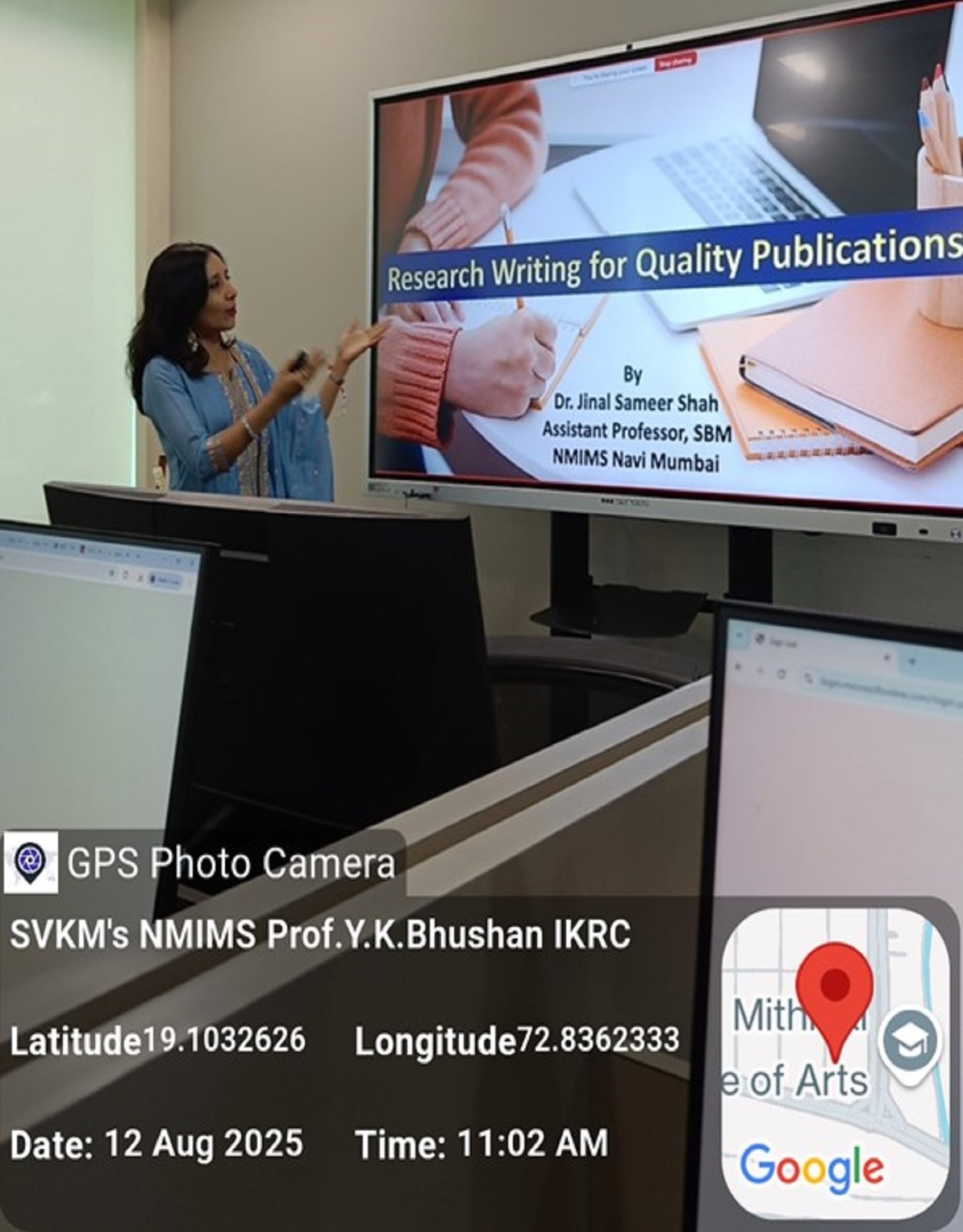
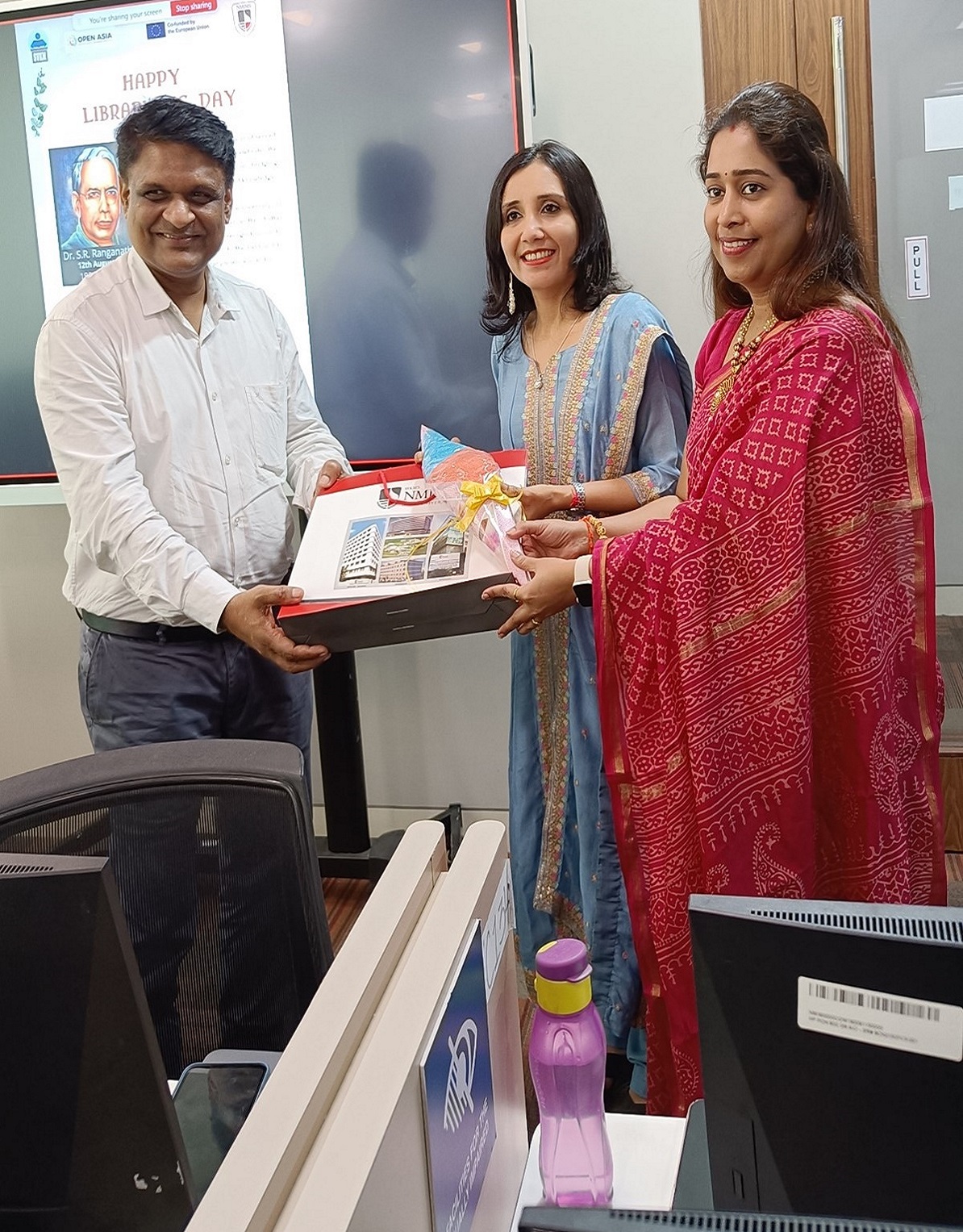
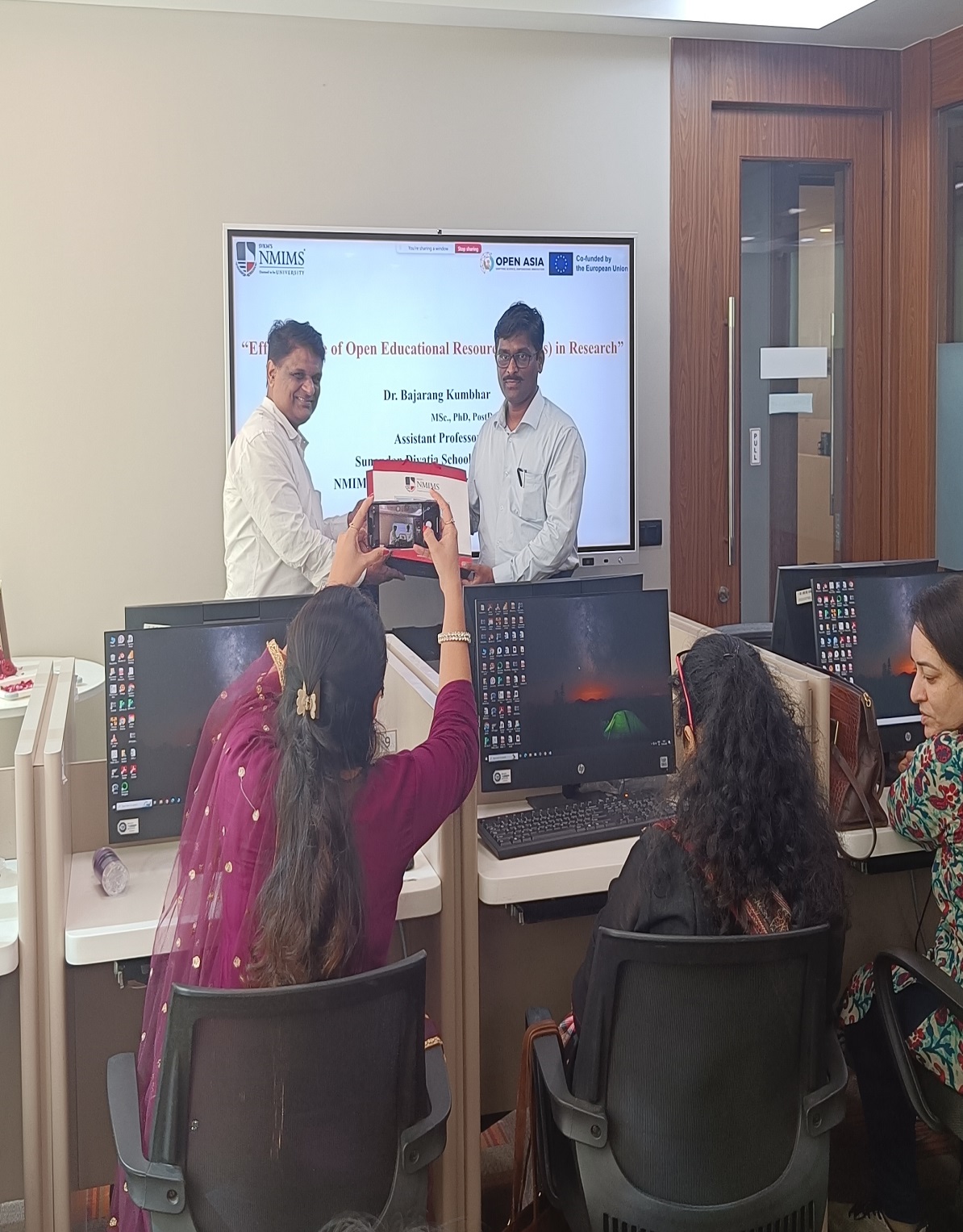
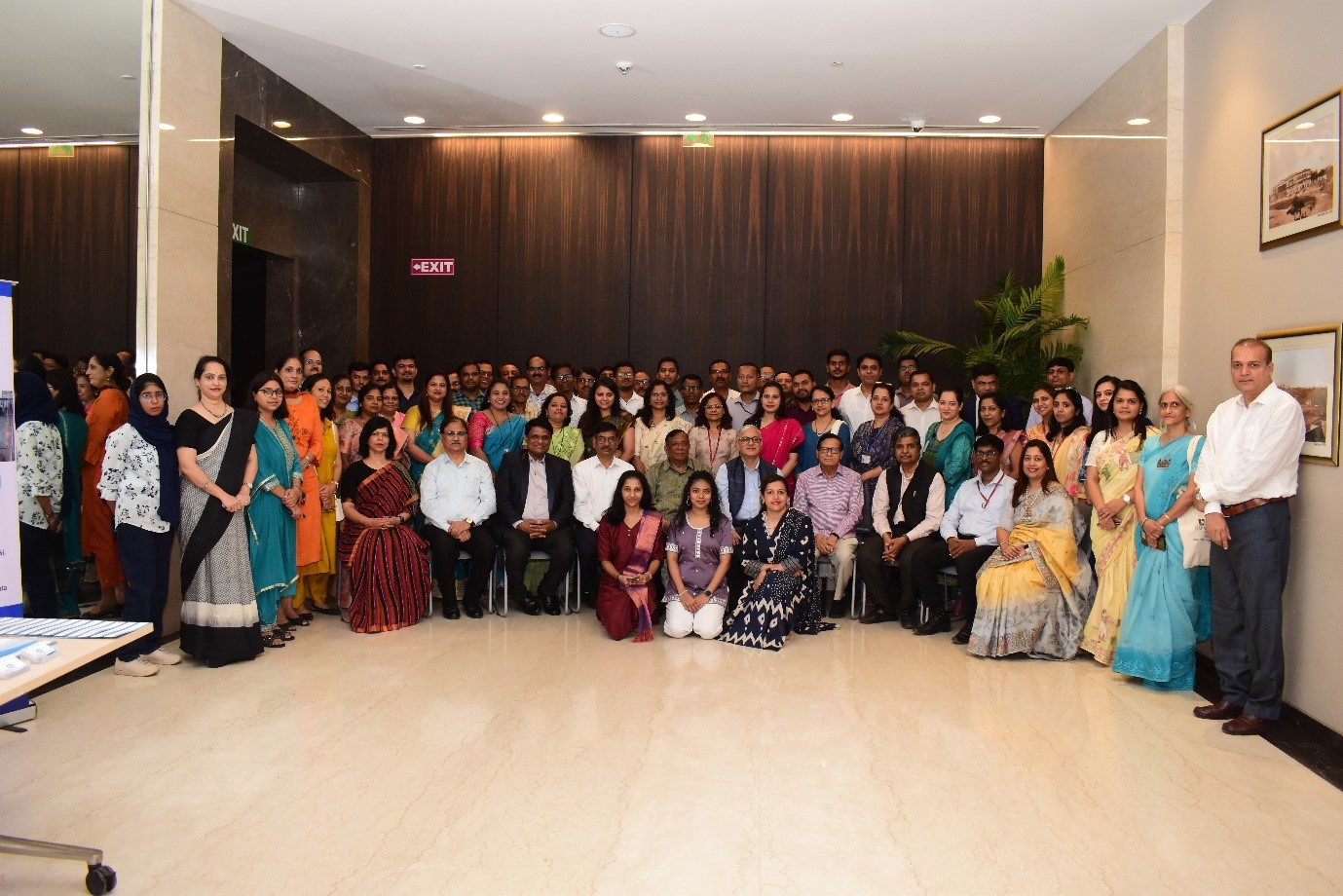
The NMIMS Library, in collaboration with Tata Consultancy Services (TCS), successfully hosted the International Library Conference on Open Science on 16th and 17th May 2025 at the NMIMS Mumbai campus. This landmark event brought together leading global and national thought leaders to explore the evolving landscape of open science, its impact on research, and the future of academic collaboration.
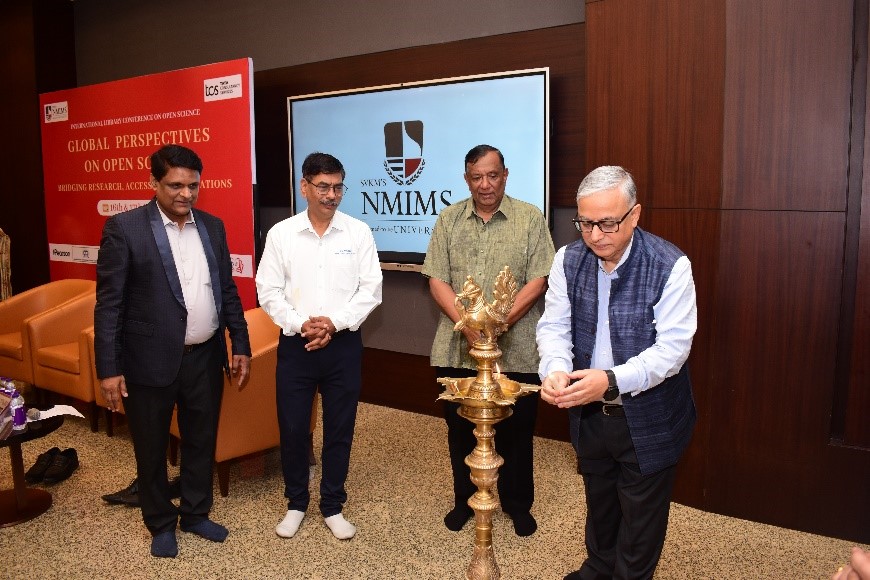
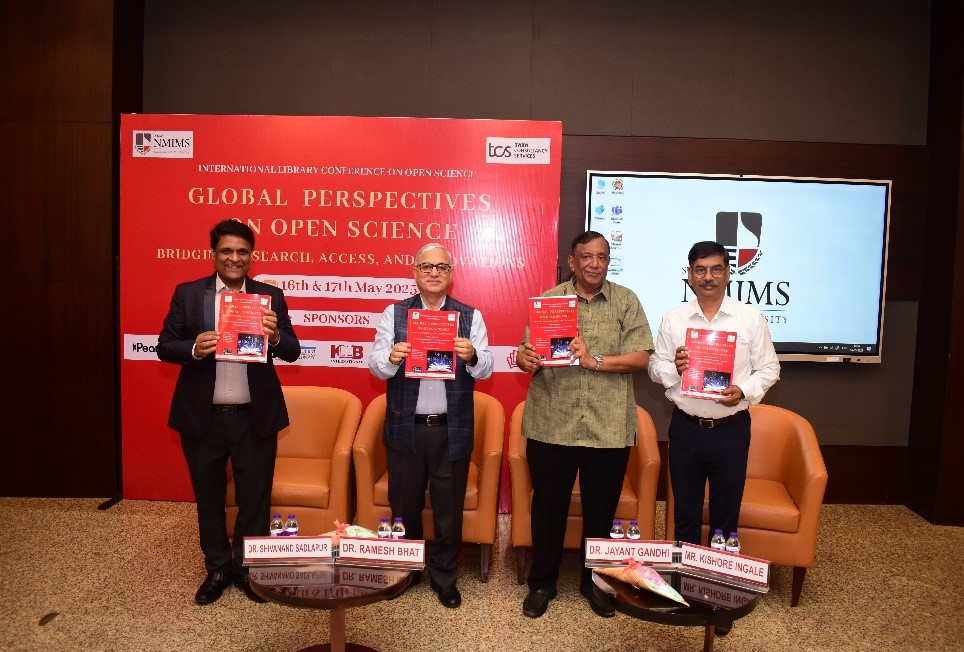
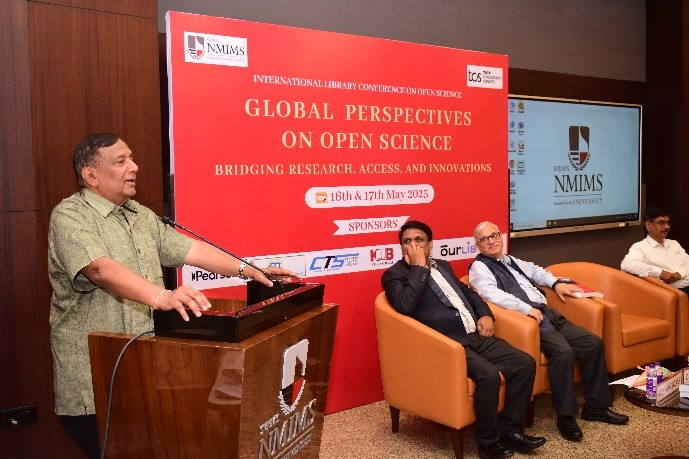
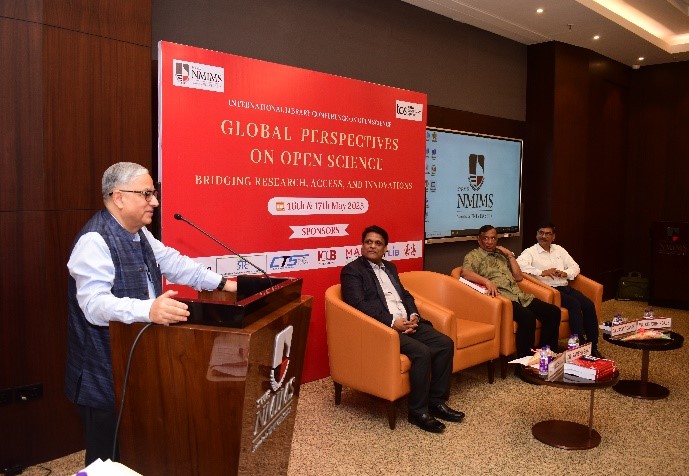
The event commenced with a welcome address by the Organising Secretary, Dr. Shivanand Sadlapur, Head – Library & Information Science Department. The conference was formally inaugurated by the Hon’ble Vice Chancellor of NMIMS, Dr. Ramesh Bhat, and the Hon’ble Secretary of SVKM, Dr. Jayant Gandhi, alongside key dignitaries from NMIMS and TCS. Dr. Shivanand Sadlapur and Mr. Kishore Ingale, Branch IRC Head at Tata Consultancy Services delivered the inaugural address, setting the tone for two days of insightful dialogue and academic exchange.
Distinguished speakers included:
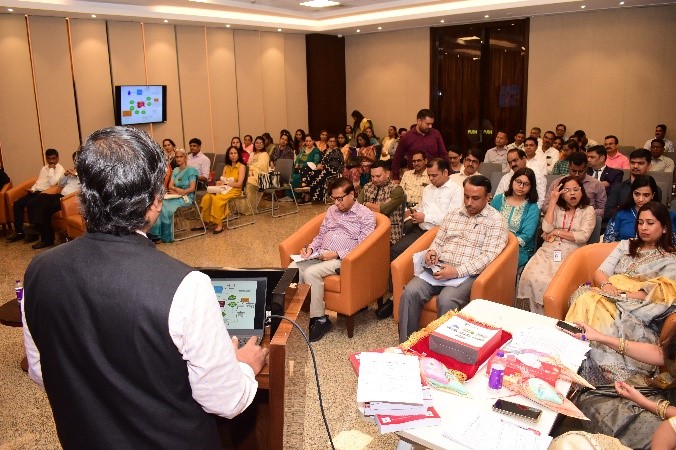
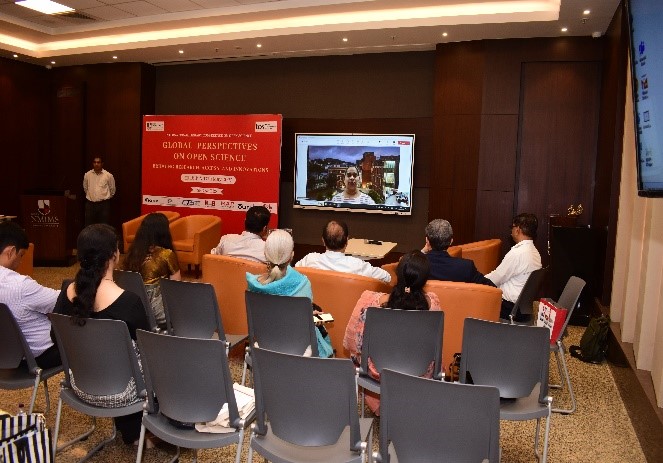
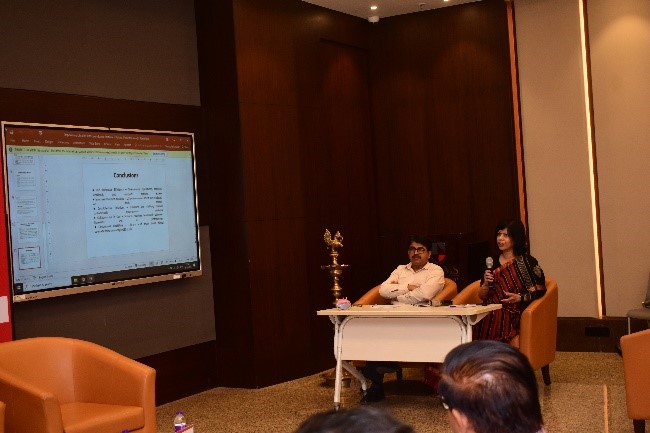
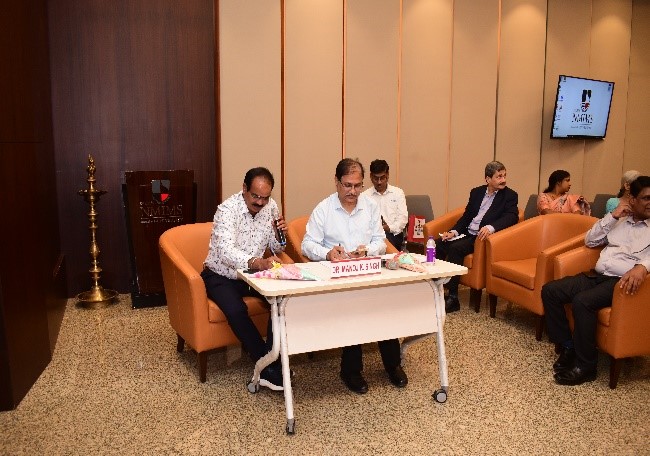
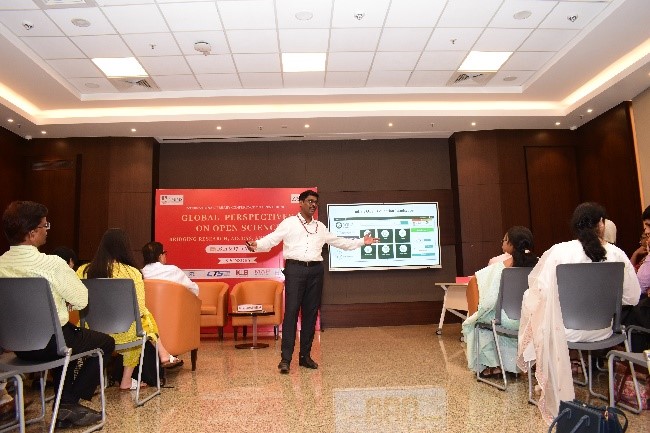
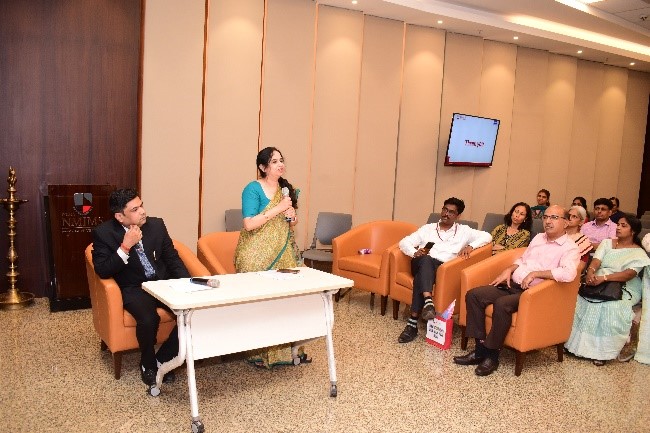
The conference featured four thematic sessions as mentioned in the below agenda: International Library Conference on Open Science
Day |
Time |
Session |
Day 116th May 2025 |
12:00 PM –01:30 PM
|
Session I: Open Access Tools · Chair: Dr. Jyotsna Singh, Director In-Charge, NMIMS Chandigarh · Co-Chair: Dr. Veeresh Hanchinal, Dy. Librarian, TISS – Tuljapur Off Campus |
|
|
02:30 PM –03:00 PM |
Guest Talk · Speaker: Dr. S.A.D.H. Namali Suraweera, Victoria University of Wellington, New Zealand · Topic: Empowering Learning Through Openness: Understanding and Using OER |
|
|
03:15 PM –04:30 PM |
Session II: Open Access Policies · Chair: Dr. Manoj Singh, Head, SIRD, BARC · Co-Chair: Dr. Mallesh Kumbhar, Librarian, SPJIMR |
Day 217th May 2025 |
10:30 AM –11:00 AM |
Guest Talk · Speaker: Dr. Nilay Yajnik, Professor & Director, Executive Education, Jio Institute · Topic: Open Access: A Teacher's Perspective |
|
|
11:15 AM –12:30 PM
|
Session III: Open Access Publishing · Chair: Dr. Shamprasad Pujar, Chief Librarian, IGIDR · Co-Chair: Dr. Subhash Athavale, Librarian & Ex-Senate Member, Mumbai University |
|
|
02:30 PM –03:30 PM
|
Guest Talk
· Speaker: Dr. Bajarang Kumbhar, Assistant Professor, SDSOS, NMIMS Mumbai · Topic: Role of Open Science in Education, Research and Innovation |
|
|
03:30 PM –04:00 PM
|
Session IV: Outside-the-theme Contributions · Chair: Prof. (Dr.) Meenal Oak, Librarian, IMCC Pune · Co-Chair: Dr. Sandeep Bhavsar, Librarian, Welingkar Institute of Management |
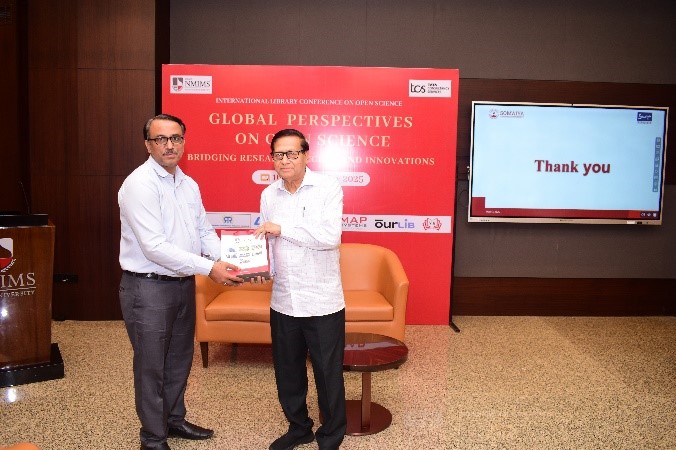
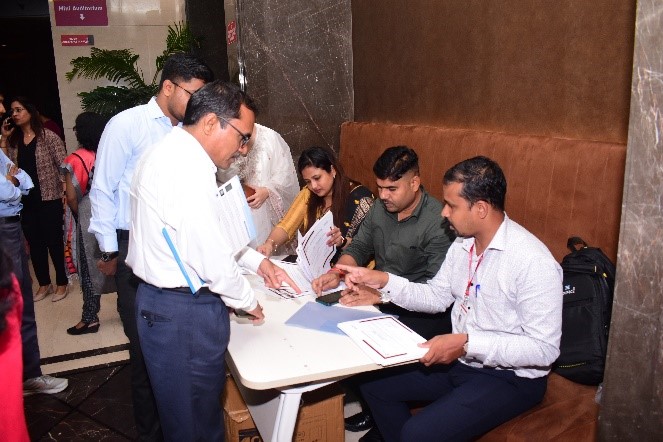
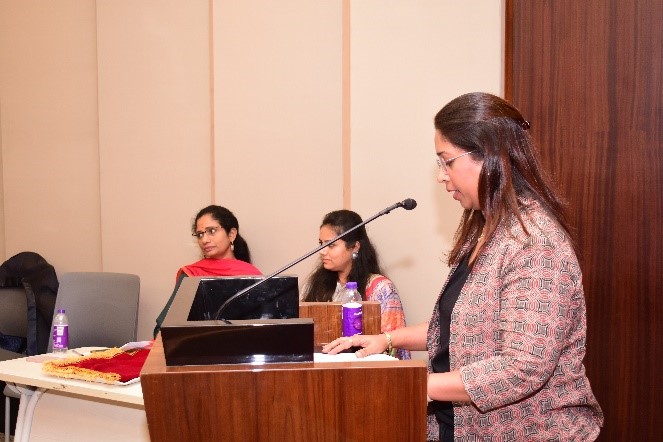
Over 100 delegates participated in the event, and 53 peer-reviewed research papers were presented and published in the official proceedings. The active involvement of session chairs and co-chairs from leading academic institutions across India promoted interdisciplinary dialogue and global academic synergy.
The conference concluded with a Rapporteur General Report by Dr. Nandkumar Dahibhate, Retired Principal Technical Officer, National Chemical Laboratory (NCL), Pune, followed by a Vote of Thanks delivered by Ms. Varsha More, Deputy Librarian, NMIMS Mumbai.
This conference marked another significant step in NMIMS’s commitment to advancing global academic engagement and open knowledge sharing.
Within the annual MakeLearn, TIIM & PIConf International Conference, held from 21 to 24 May 2025 in Bangkok, Thailand, and organized by ISSBS, Slovenia, and its partners, the Erasmus+ project OPEN-ASIA: Boosting engagement of HEIs in Open Science in India and Malaysia was presented to approximately 220 participants—around 140 attended in person in Bangkok, and 80 joined online. After the conference, the proceedings will also be published, further enhancing the project’s visibility.
OPEN-ASIA project was presented during the Project opportunity panel .It was also featured in the conference session on 23 May 2025 with the contribution titled Embedding Unesco-Defined Open Science In Higher Education Institutions: Challenges and Opportunities (authors: Nada Trunk Širca, University of Primorska, International School for Social and Business Studies, Slovenia; and Špela Dermol and Valerij Dermol both from International School for Social and Business Studies, Slovenia)
Participants expressed significant interest in the project results, particularly in the development of open science infrastructure and training programmes in open science, as well as in the use of the open educational resources available on the e-platform elearningproject.eu . These resources allow participants to study the topic free of charge and earn a digital open badge.



3rd Consortium Meeting & Open Science Forum.
February 24–27, 2025 | Thapar Institute of Engineering and Technology, India (TIET), Patiala, India
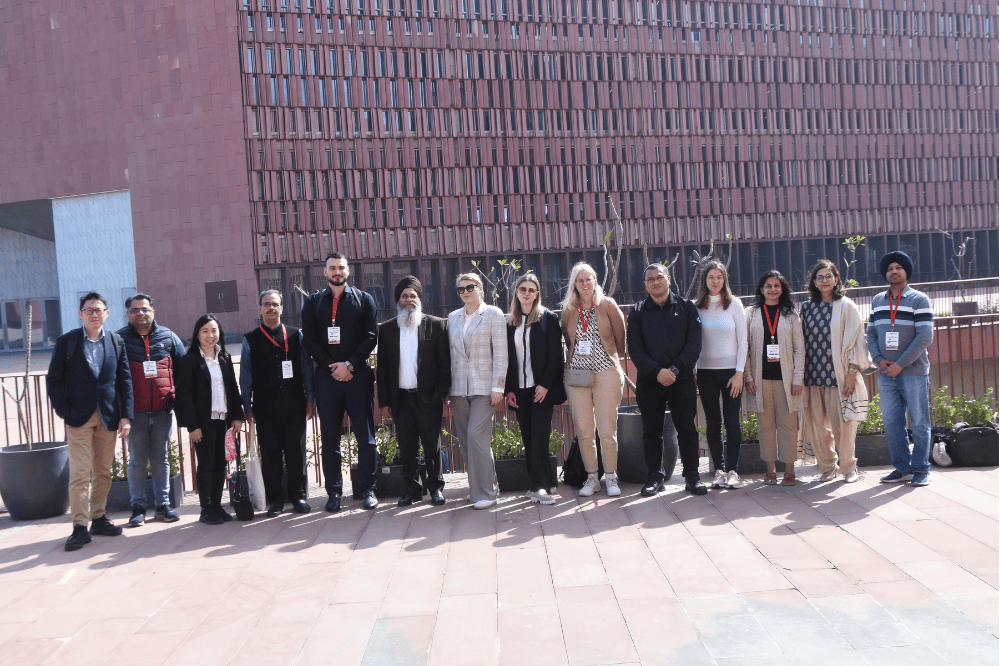
The third project meeting of the Erasmus+ project OPEN-ASIA: Boosting Engagement of HEIs in Open Science in India and Malaysia (Reference No. 101128493) was successfully hosted by Thapar Institute of Engineering and Technology (TIET), Patiala. The event took place from 24th to 27th February, 2025, and included both the 3rd Consortium Meeting and the 3rd Open Science Forum (OSF3) under the OPEN-ASIA initiative.
NMIMS was represented by Dr. Jayakumar Singh, Dean of the Sunandan Divatia School of Science, Dr. Archana Bhise, Associate Dean, Research, Mukesh Patel School of Technology Management & Engineering, and Ms. Meena Saxena, Director, International Linkages & Global Project Coordinator.
The meeting convened key stakeholders from academia, industry, and research institutions across India, Malaysia, and Slovenia. In-depth discussions focused on fostering a robust culture of Open Science—emphasizing collaboration, transparency, and equitable access to scientific research. Participants engaged in meaningful dialogues aimed at strengthening collaborative research ecosystems, aligned with global best practices and emerging national policy frameworks.
Open Science Meeting
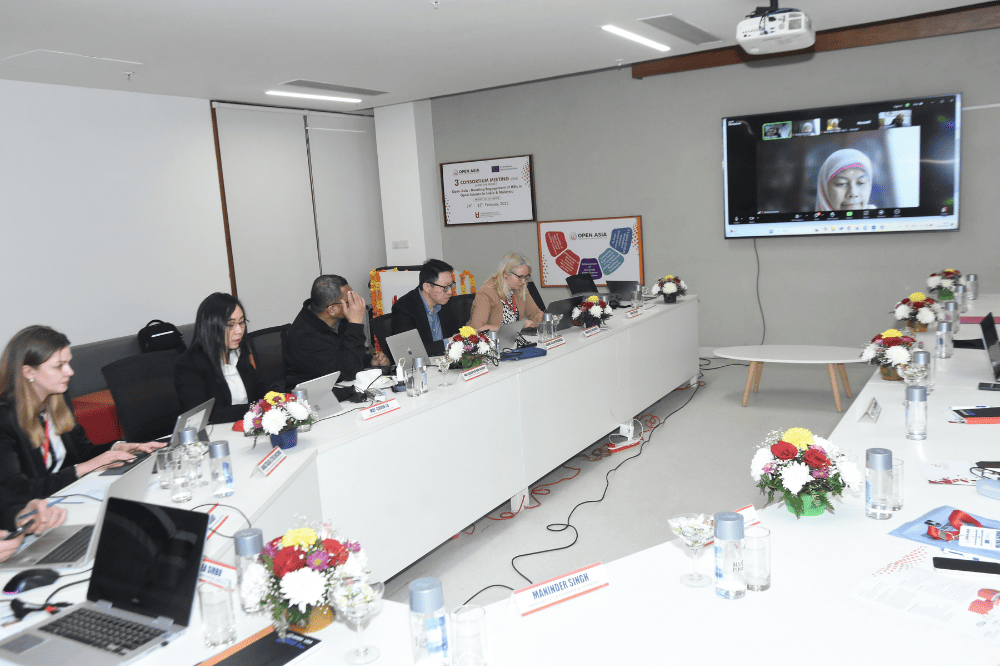
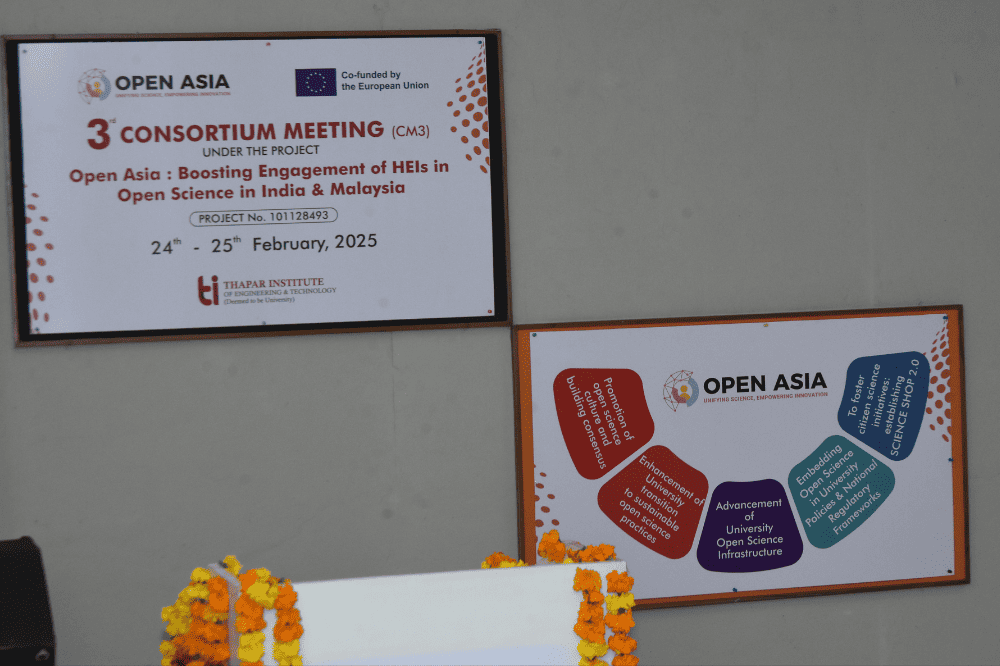
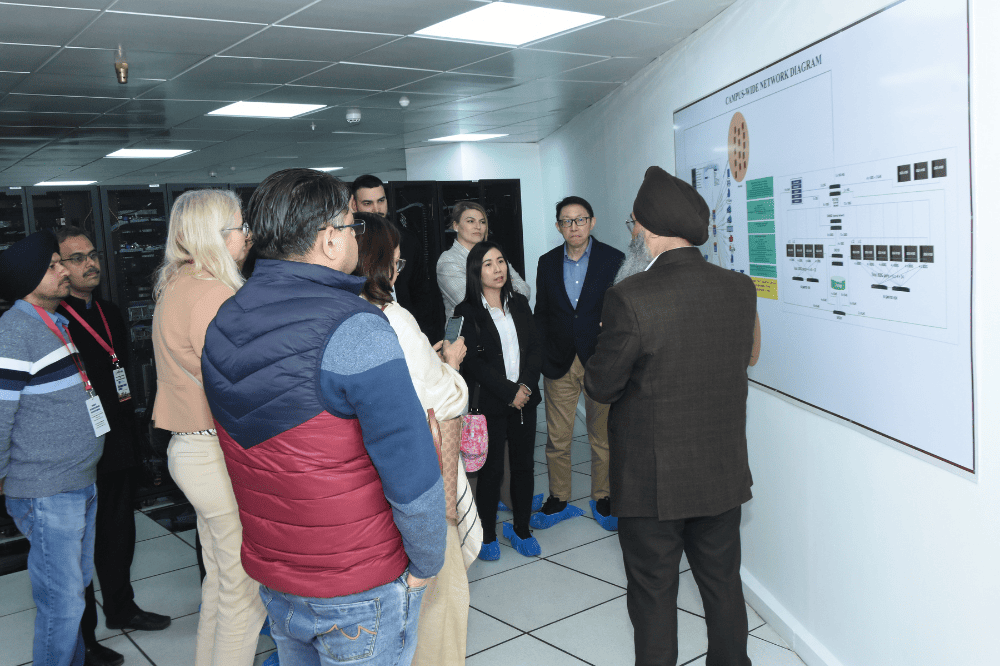
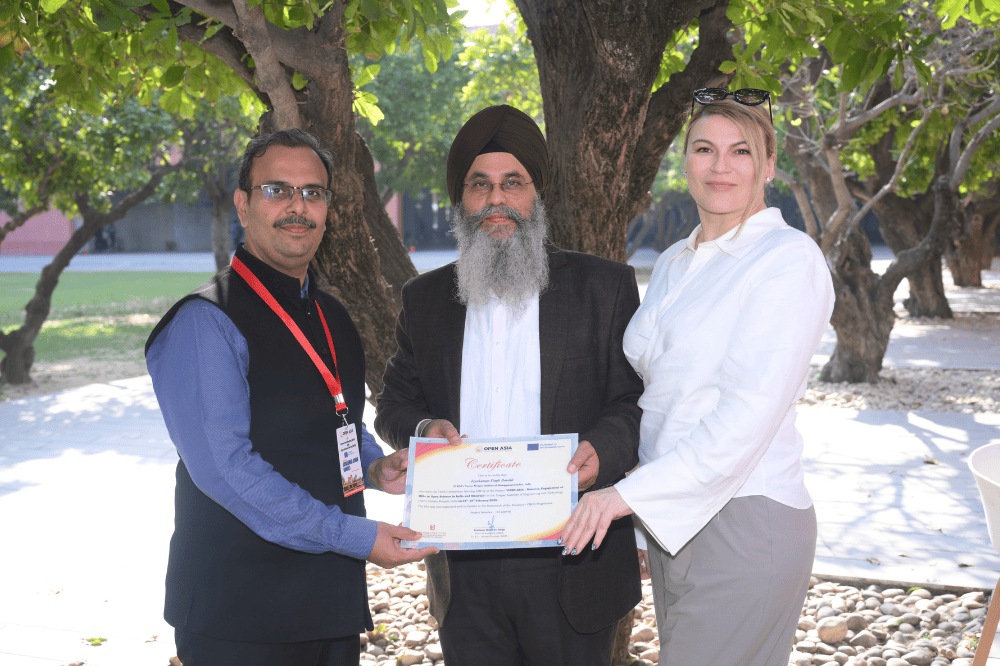
Open Science Forum (OSF3) Sessions

Key Takeaways
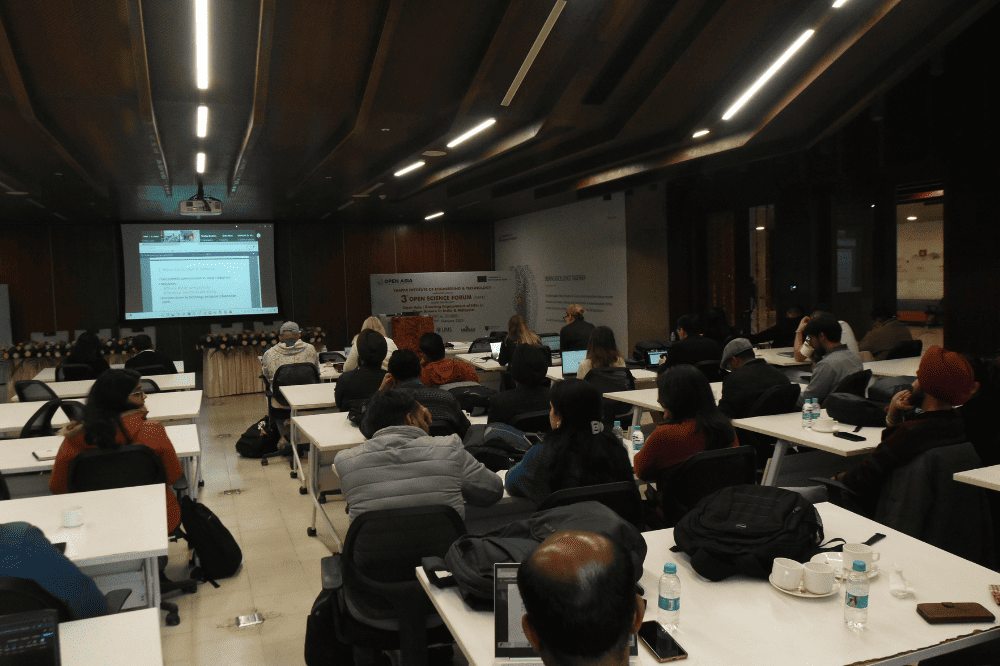
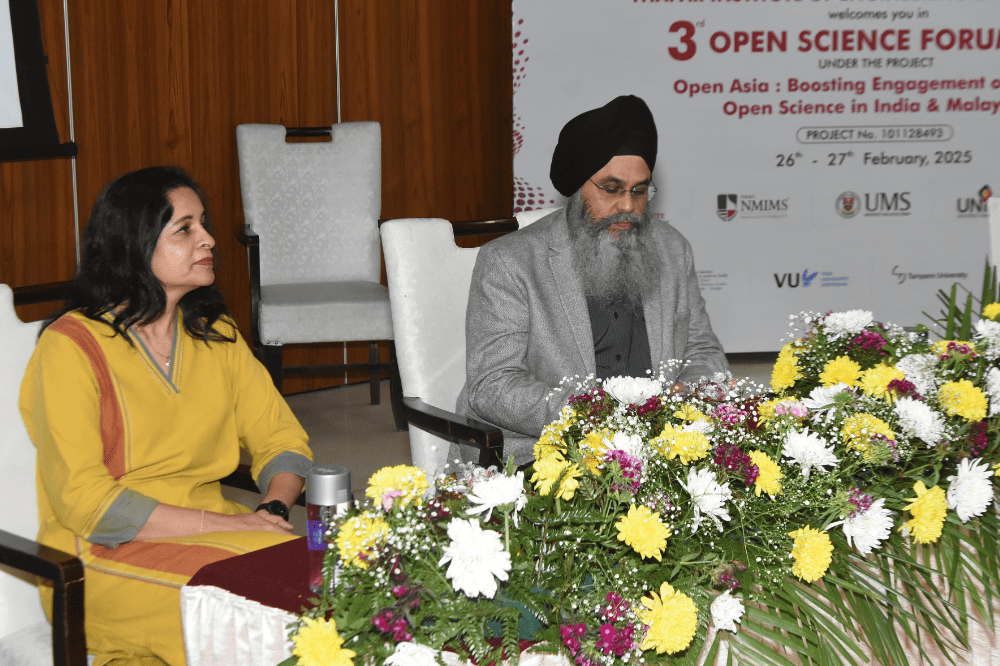
Dr. Mayank Joshipura (Associate Dean-Research, SBM, SVKM’s NMIMS,) and Dr. Jayakumar Singh Bondili (Dean, SDSoS, SVKM’s NMIMS) participated in the capacity building workshop conducted by Virje University (VU), Amsterdam, Netherlands from 17th to 21st June, 2024. The workshop was coordinated by Dr. Marjolein Zweekhorst (Professor, Faculty of Science, Athena Institute, VU) and Dr. Sarju Sing Rai (Assistant Professor, Faculty of Science, Athena Institute, VU).
The capacity building workshop 2 (CBW2) focused on “Public Engagement via Science Shop and Community Service Learning" was organized as a part of the OPEN-ASIA project co-funded by the Erasmus+ programme of the European Union. The participating organizations included SVKM’s NMIMS (India), University of Malaya (Malaysia), University Malaysia Sabah (Malaysia), University Malaysia Sarawak (Malaysia), International School for Social and Business Studies (Slovenia) and institutions from Botswana and Zambia from OSCAR 2.0 project.
The five-day workshop focused on major theme of enhancing public engagement in science including science shops, community service learning, citizen science and knowledge equity. The quality of discussions was enhanced by participation of African institutions under OSCAR 2.0 institutions as it helped understand the open science initiatives and progress in Africa.
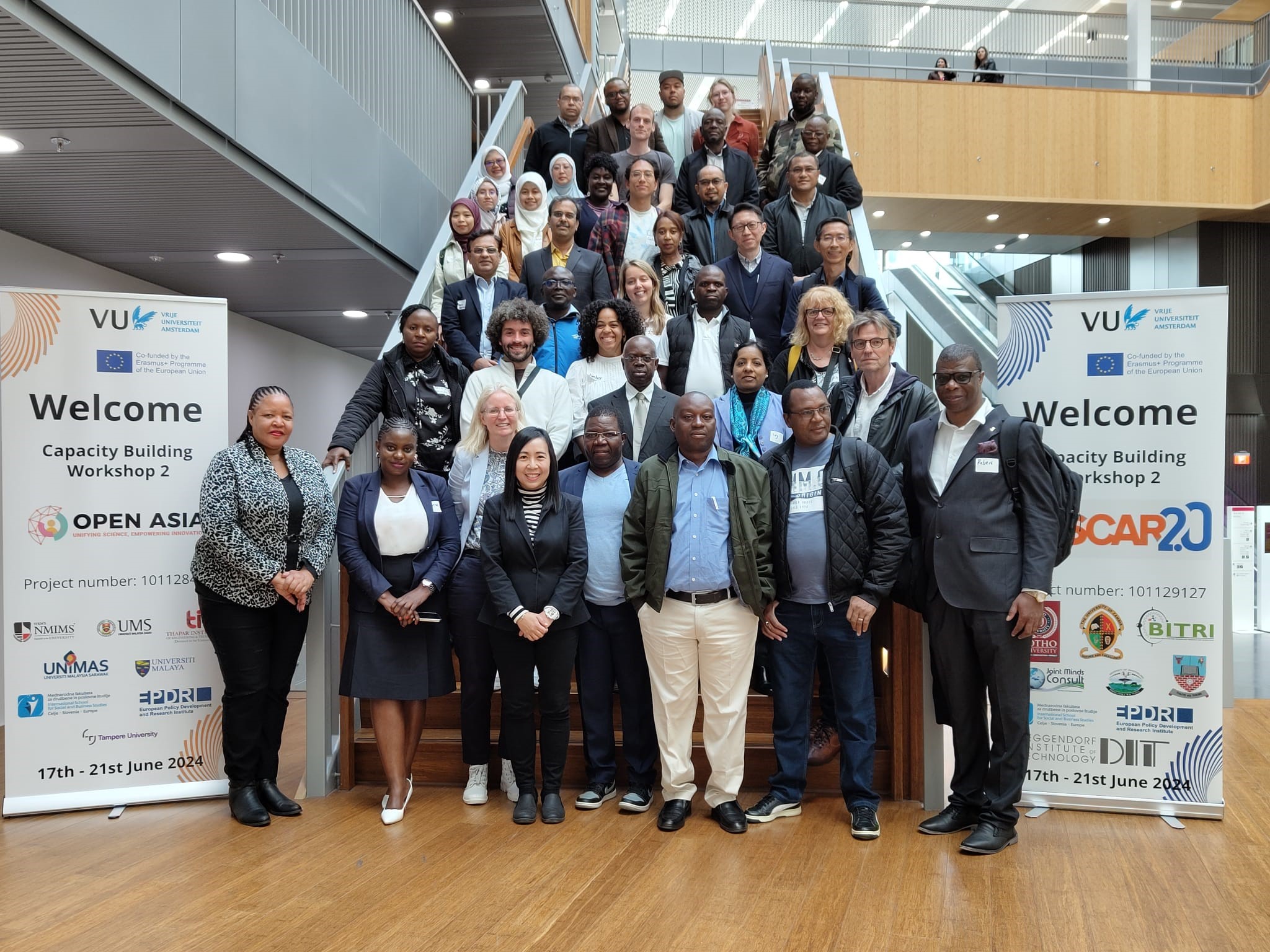
1st day kick-started by welcome address by Dr. Jacqueline Broerse (Drector, Athena Institute, VU) and Dr. Marjolein Zweekhorst followed by brief presentations from participating institutions. Dr. Joshipura made presentation on NMIMS University and highlighted the University’s contributions toward open science focusing on WeCare (Community Service Learning), Ground water recharge project in Shirpur (Shirpur Pattern), open science knowledge shared by NMIMS in form of downloadable books and open access journal. The 2nd half focused on the Science Shop presentation by VU and workshop on science shop to build institutional vision and implementation of science shop at participating institutions.
2nd day started with presentation on Science Shop by VU followed by presentations from participating institutions and to learn from best practices from other institutions. The 2nd half included presentations from European Universities on International learning lab, sharing their experiences on public engagement through community service learning including. Karsten Altenschmidt,(UNIKTIV, Germany), Geertje Tijsma (VU, Netherlands), Nataša Matulayová (UPOL, Czech Republic), Avril Lombardi Bolaño & Janaina de Oliveir (URV, Spain).
3rd day focused on role of libraries in open science with presentation by VU library and the 2nd half the participants visited public library to participate in “Science with Society Festival” fousing on conversations between citizens, students, scientists, community partners and policy makers. Dr. Joshipura participated in “energy transition’ whereas Dr. Bondili participated in “mental health” conversations.
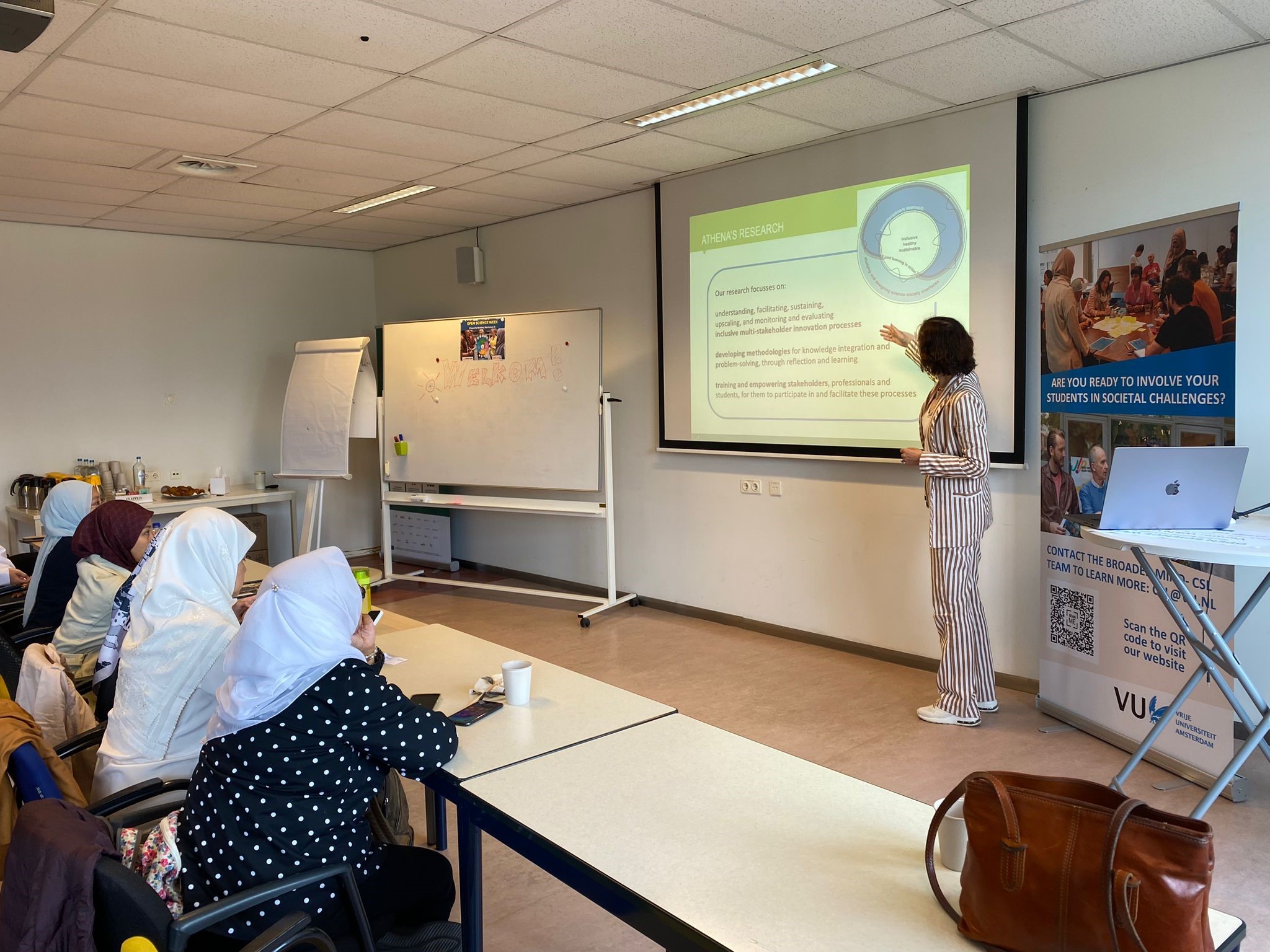
4th day was dedicated to Knowledge Equity Symposium with presentations by experts and series of panel discussion on Knowledge Equity in Education and research. It started with informal welcome by Marjolein Zweekhorst and Sander Bosch followed by formal welcome speech by Miranda van Holland (VU). Dr. Cees Hamelink, Professor Emirates (VU) delivered keynote address on Knowledge equity. Dr Pius Mosima (Cameroon) , Sandra Hasanefendic (VU), Natasa Matulayova (Czechia), Dr Clement Dr Niyerenda (South Africa) shared their experiences on knowledge equity and research followed by short presentations by Victor de Boer (VU), Amrita Das (VU), Michele Meijer (VU), Prof Maurice Crul (VU). Dr. Masood (Leeds) presented Knowledge Equity network followed by panel discussion on Role of Libraries in Koowledge Equity including Hilde van Wijngaarden (VU), Masud Kokhar (Leeds), Shirlene Neerputh (UWC) as panellists. Dr. Bondili participated as a panelist one of the panel discussions on Knowledge Equity along with participants from three other participants from OSCAR 2.0 and Open Asia project institutions.
5th day started with institutional science shop plans. Dr. Joshipura and Dr. Bondili presented plan to build upon Wecare (community service engagement) and make it interdisciplinary, focusing on transdisciplinary approach to research focusing on transdisciplinary research units/clusters focusing on issues facing business, society and environment. The 2nd half was about students’ poster presentations on science shop projects.
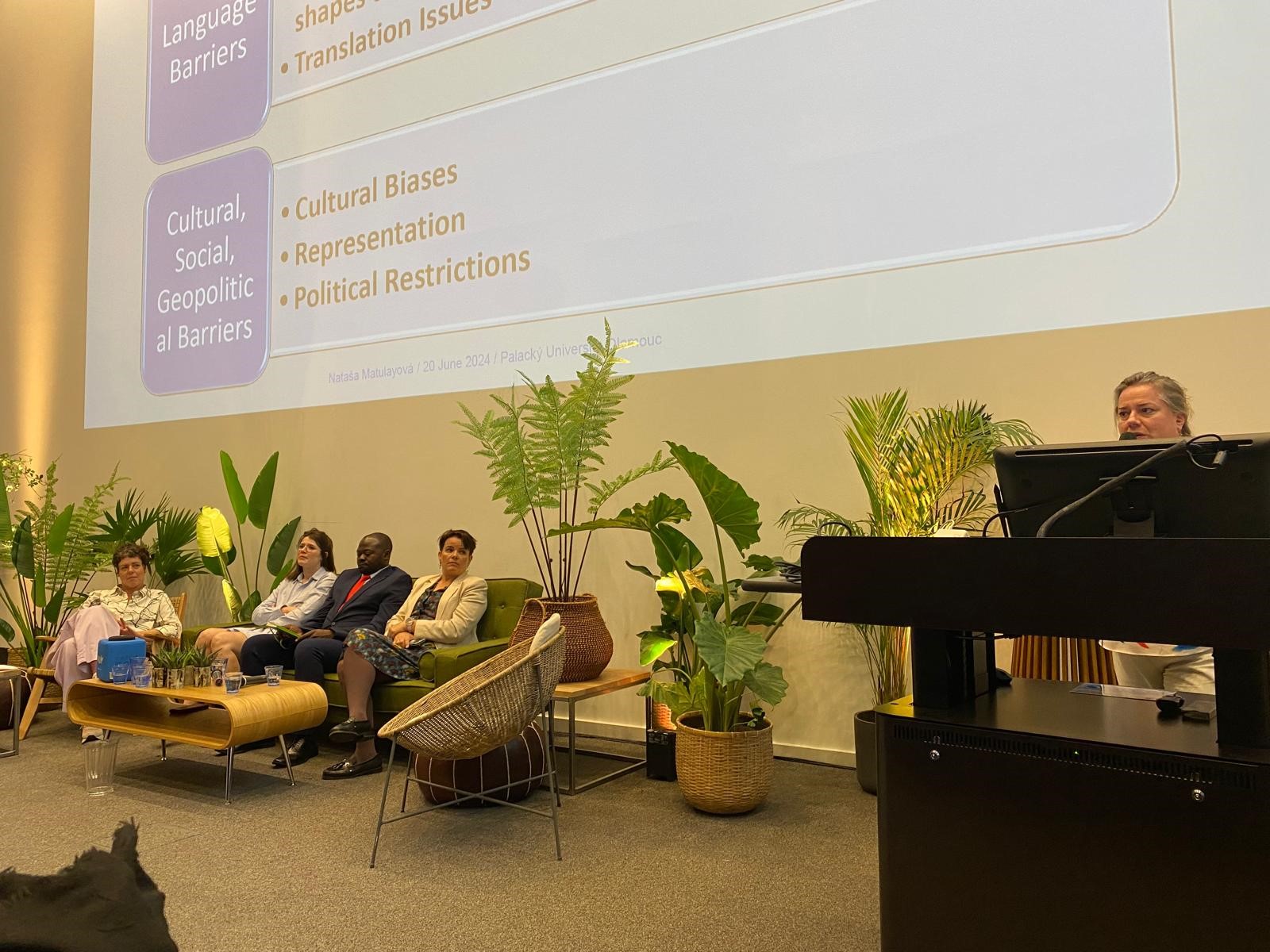
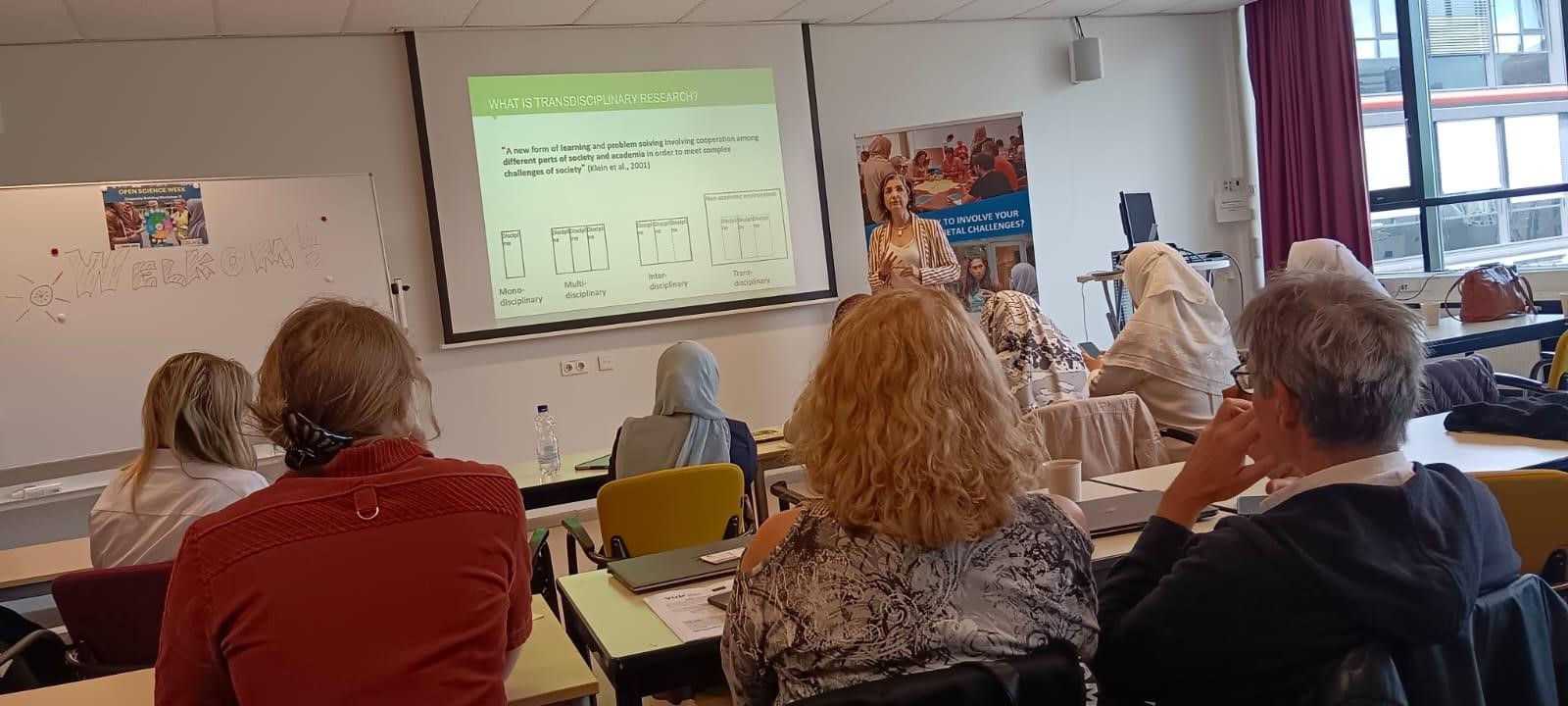
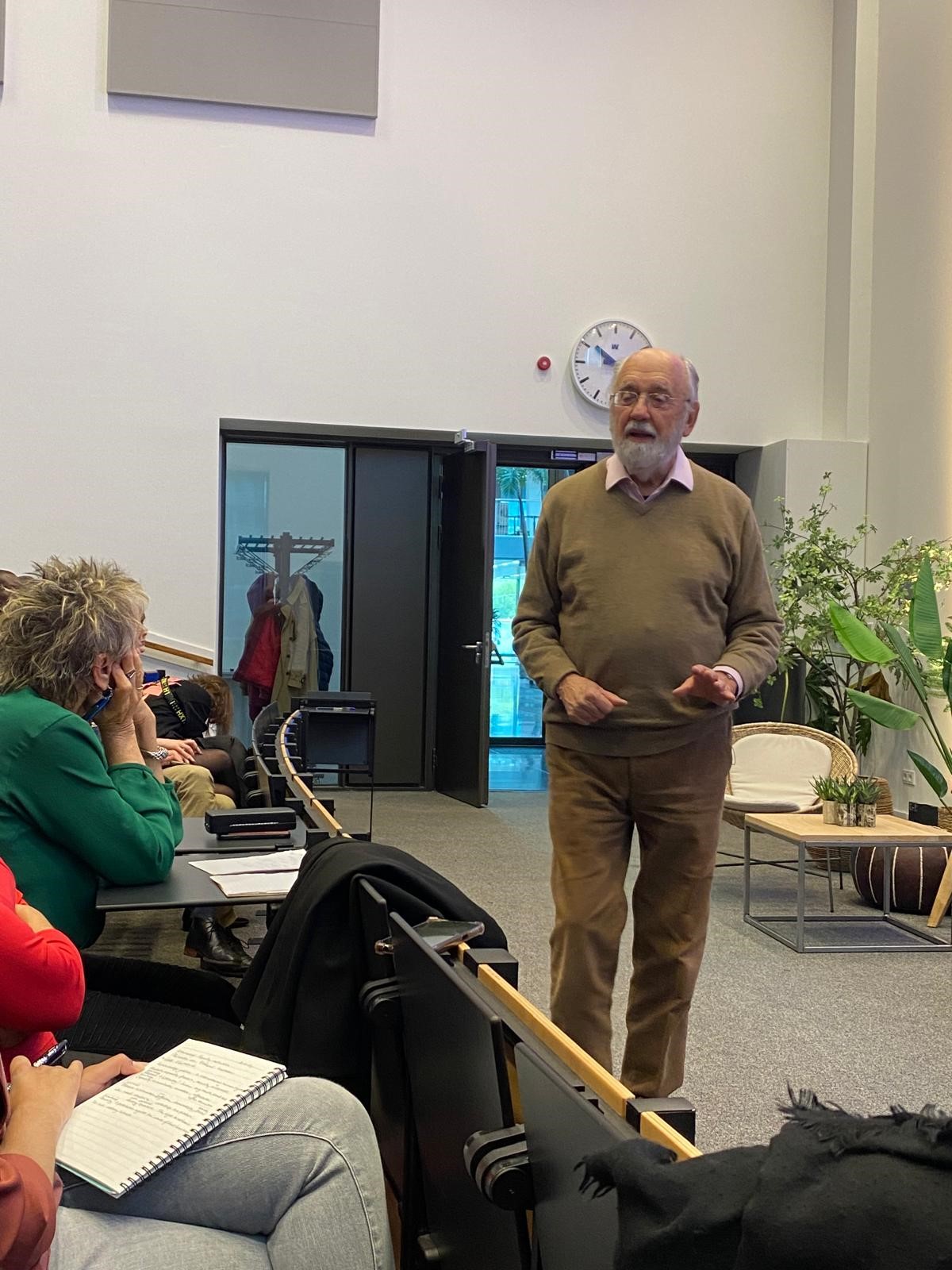
Beside the workshop, VU arranged for a forest walk (17th evening), boat city tour (19th evening) and interactive play at public library (20th afternoon) which offered networking opportunity and informal interactions.
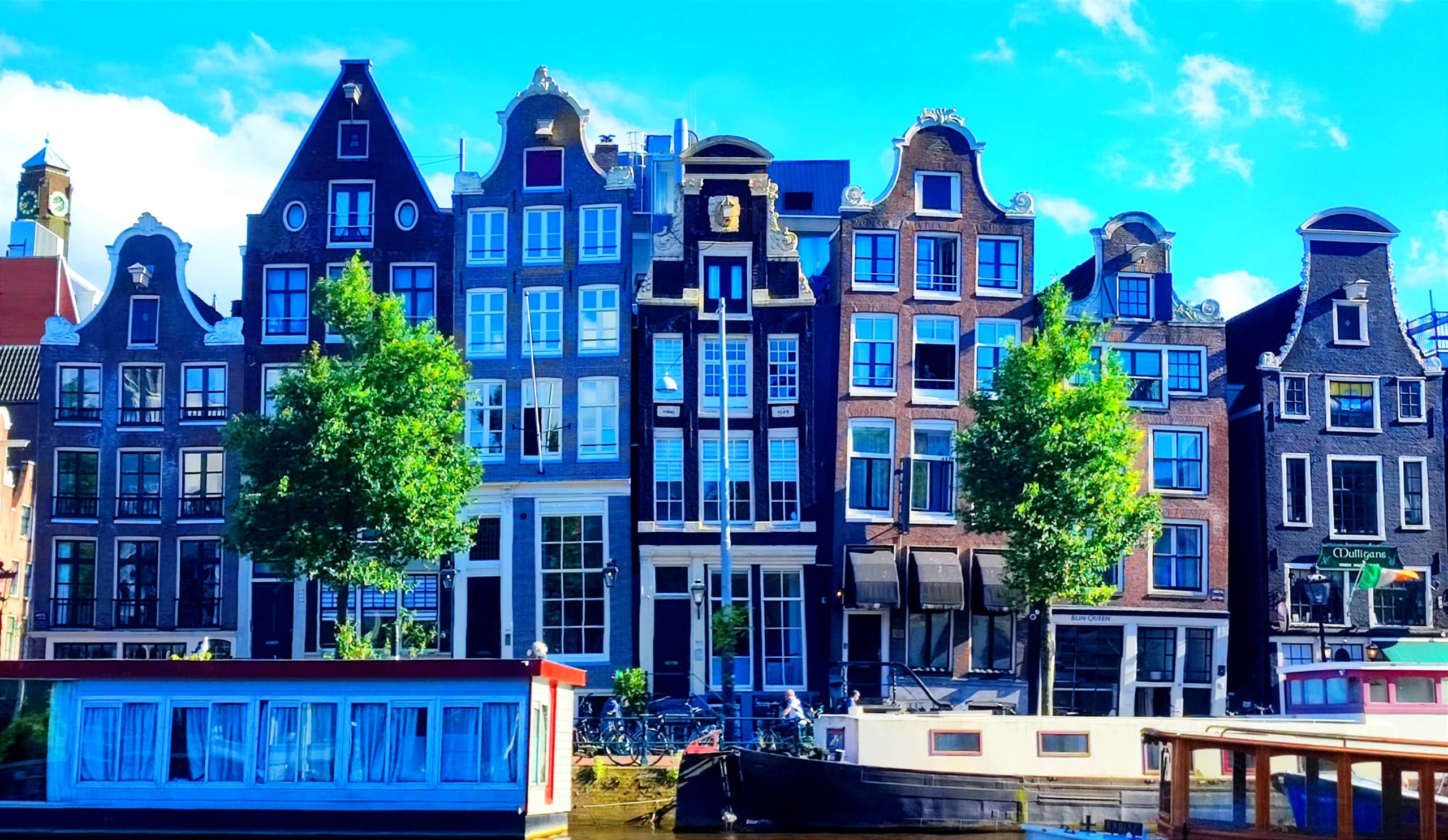
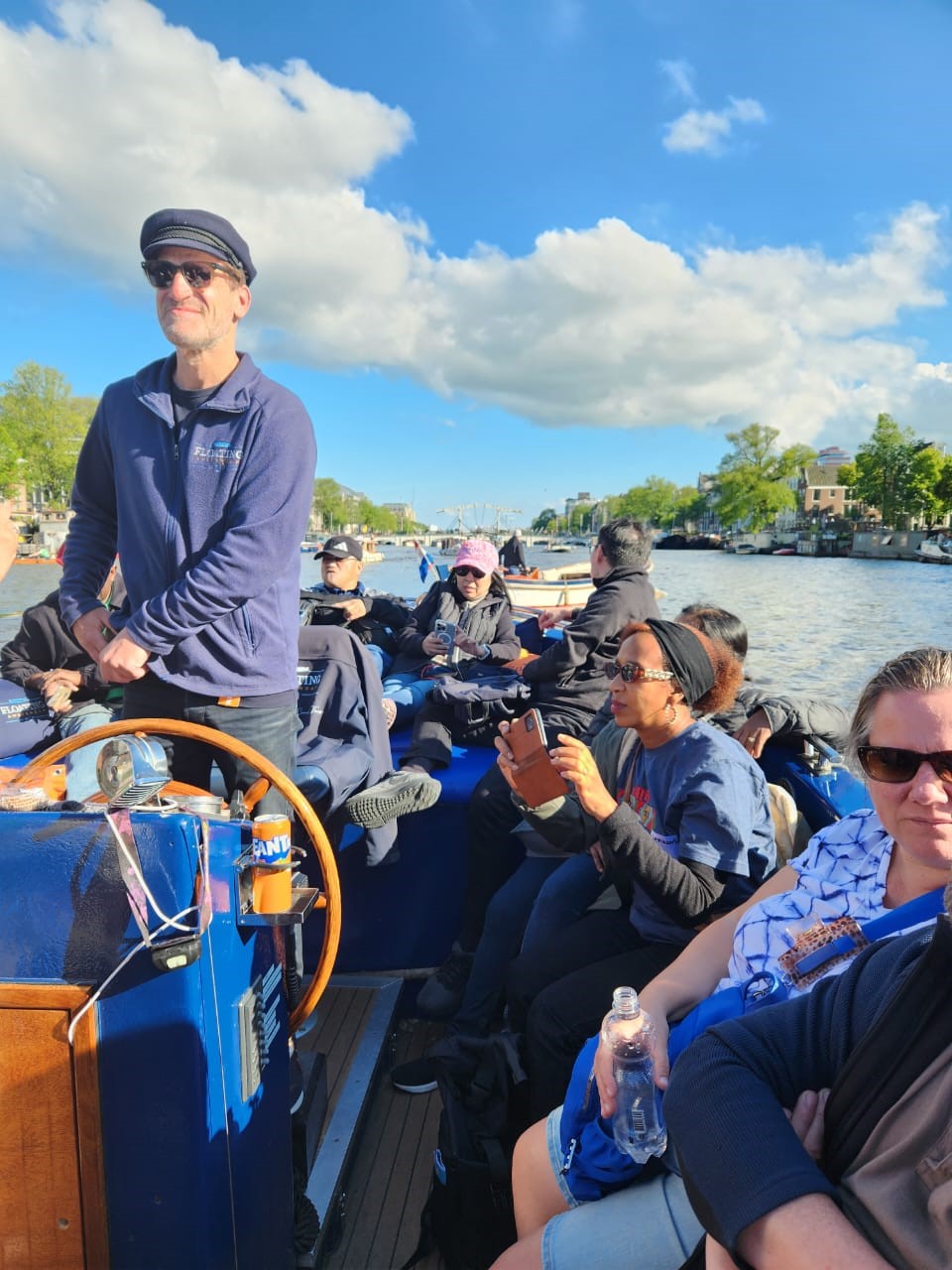
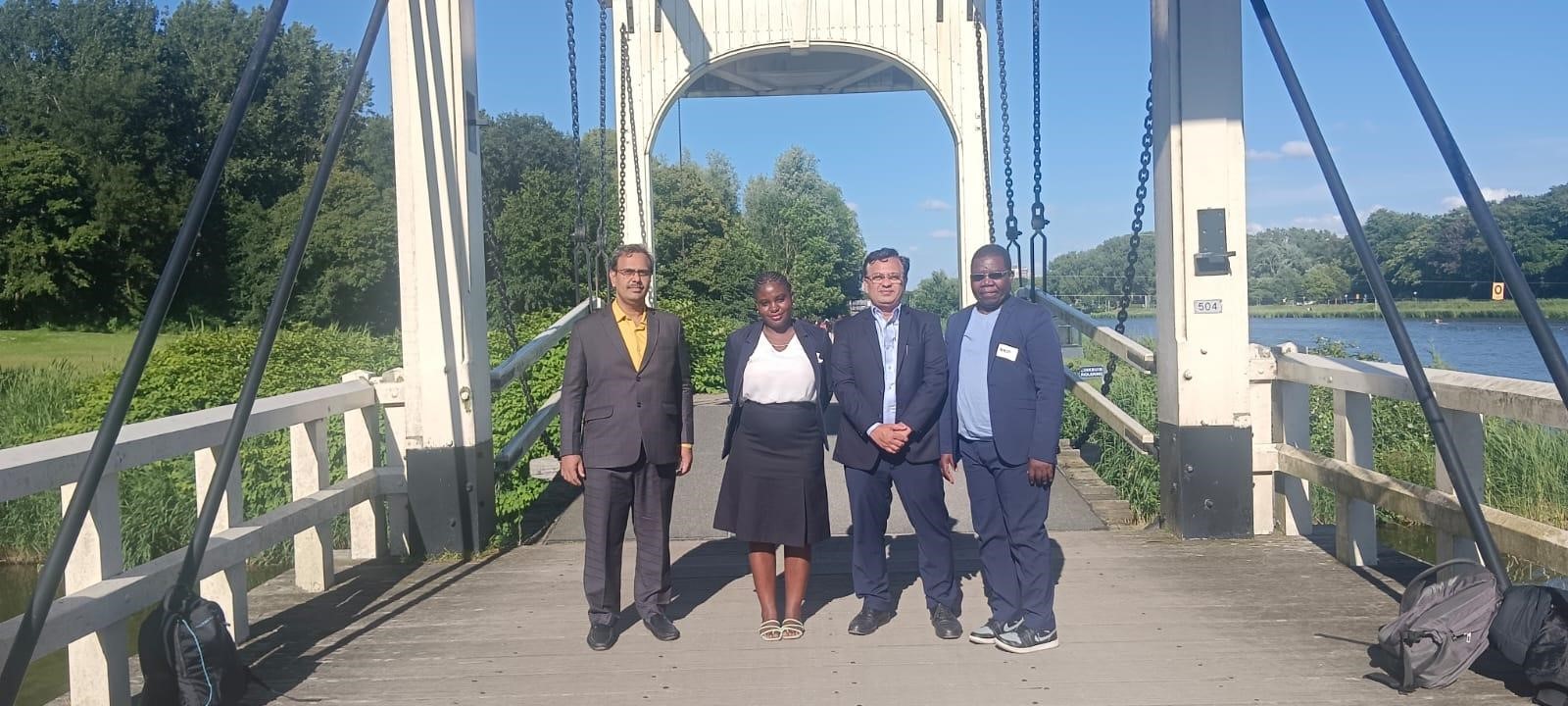
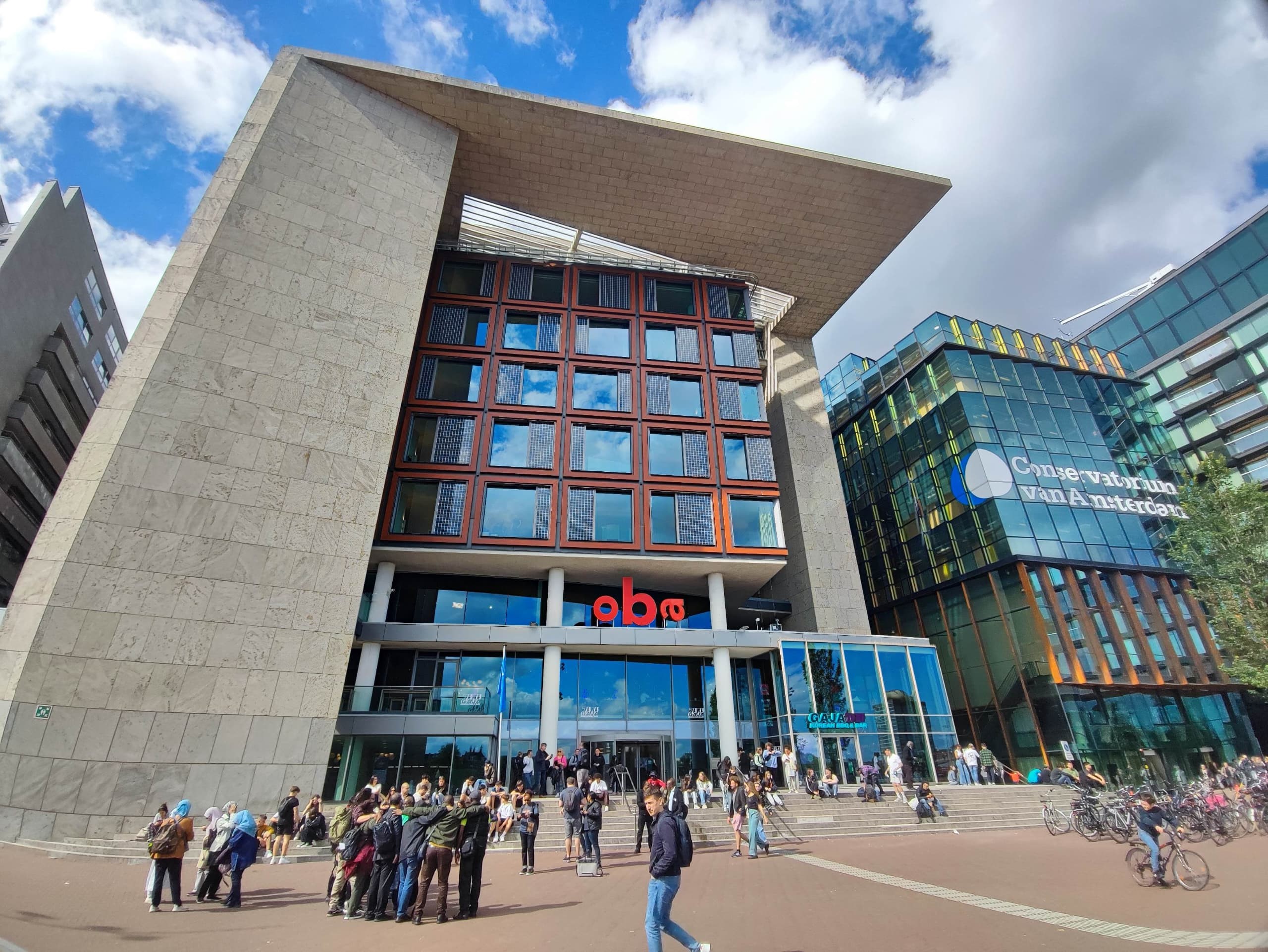
Overall, the five-day workshop focused on open engagement of social actors through initiatives such as science shops, community service learning, knowledge equity and role of libraries. We established connections with participating institutions from Open Asia, OSCAR 2.0 and speakers from European region. These connections will help us setting up data management plan and data repository, exchanging best practices in community service learning and open science, offering interdisciplinary course linked to community service learning with the help of VU in select schools such as School of Science, attracting international Ph.D. students and fostering research collaborations. Dr. Mayank Joshipura and Dr. Jayakumar have already joined Knowledge Equity Network in their individual capacity and identifying research units for cluster-based research and incorporating data management plan for faculty and doctoral scholars is initiated and it is included in University Ethics code as well as Ph.D. programme course work in subject titled “Research and Publication Ethics”.

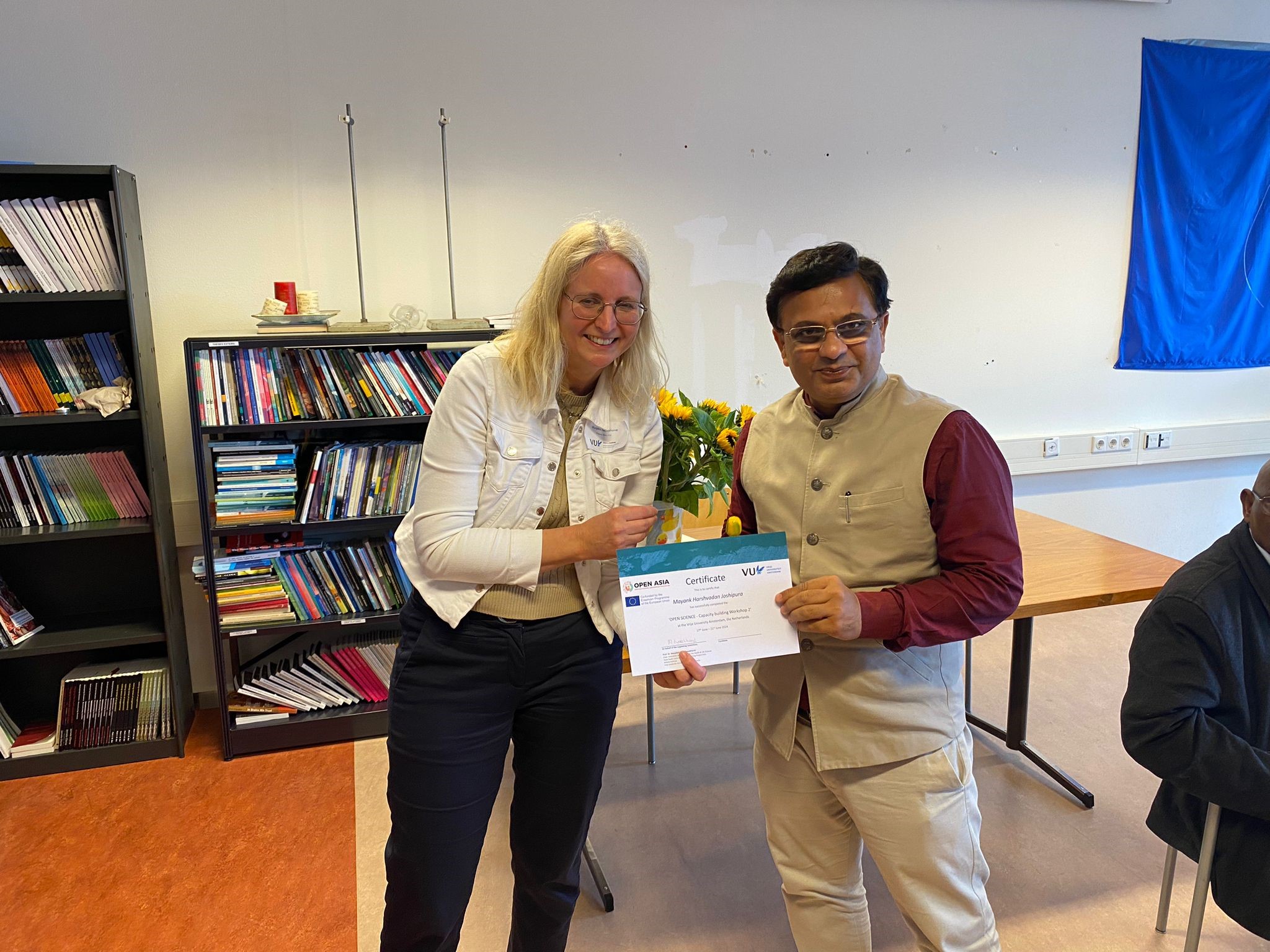

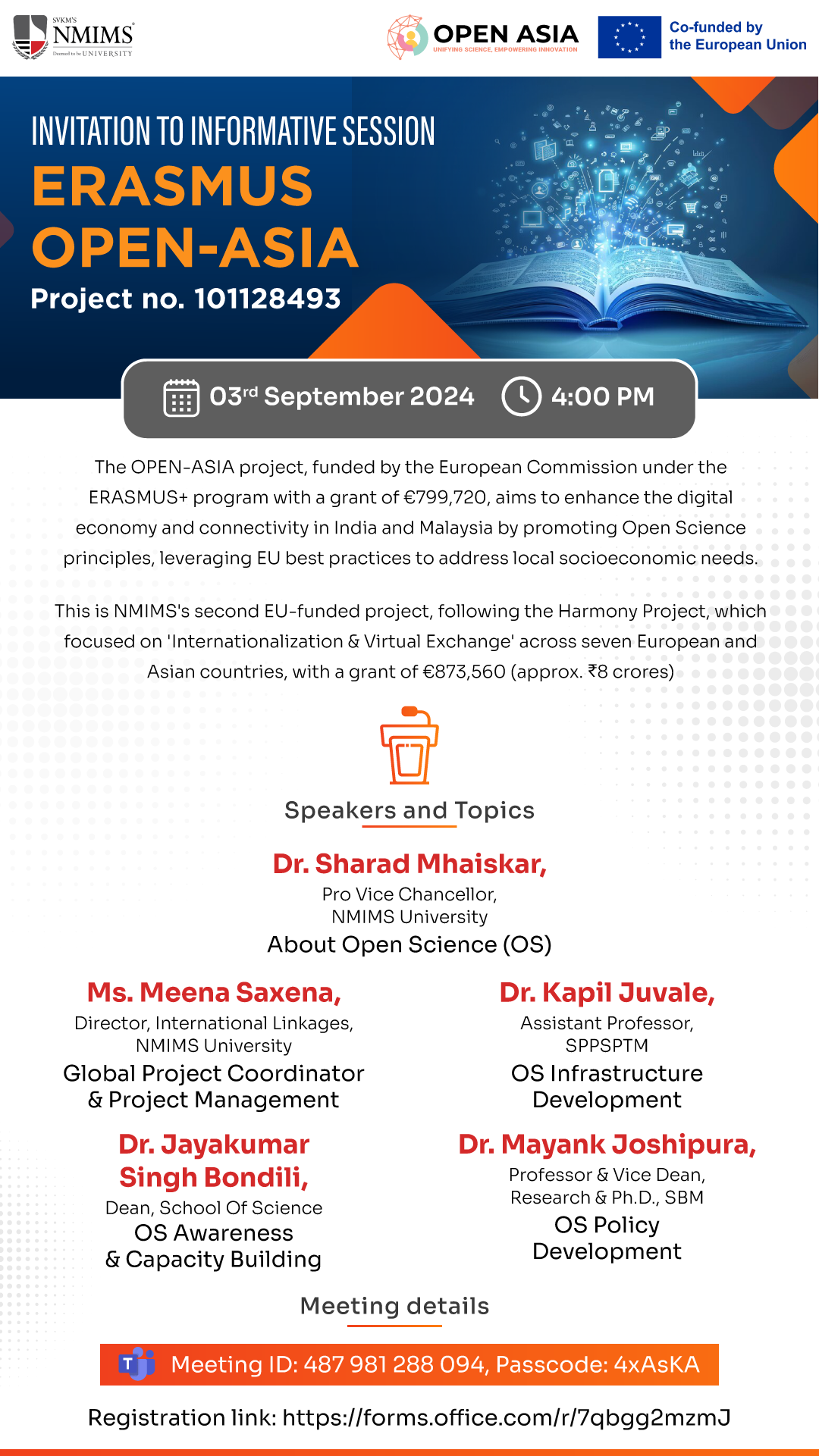
The NMIMS Department of International Linkages successfully organized an informative session on the ERASMUS+ OPEN-ASIA Project (#101128493), co-funded by the European Union. NMIMS faculty and staff across its 18 schools and eight campuses were invited for this virtual session The session took place on Tuesday, 3rd September 2024, from 4:00 PM to 5:00 PM.
Objective of the OPEN-ASIA Project
The OPEN-ASIA project seeks to advance the digital economy and connectivity in India and Malaysia by promoting Open Science principles. It leverages best practices from the European Union to address local socioeconomic needs and challenges.
Purpose of the Session
The session aimed to provide NMIMS faculty and staff with critical insights into this prestigious project, including its goals, structure, and planned activities.
Key Highlights of the Session
Conclusion
The session offered a rich and comprehensive understanding of the ERASMUS+ OPEN-ASIA Project and underscored NMIMS University's commitment to fostering innovation, collaboration, and global best practices in research through Open Science initiatives. The interactive presentations provided valuable insights into how the project’s activities and objectives align with NMIMS's strategic vision for internationalization and research excellence

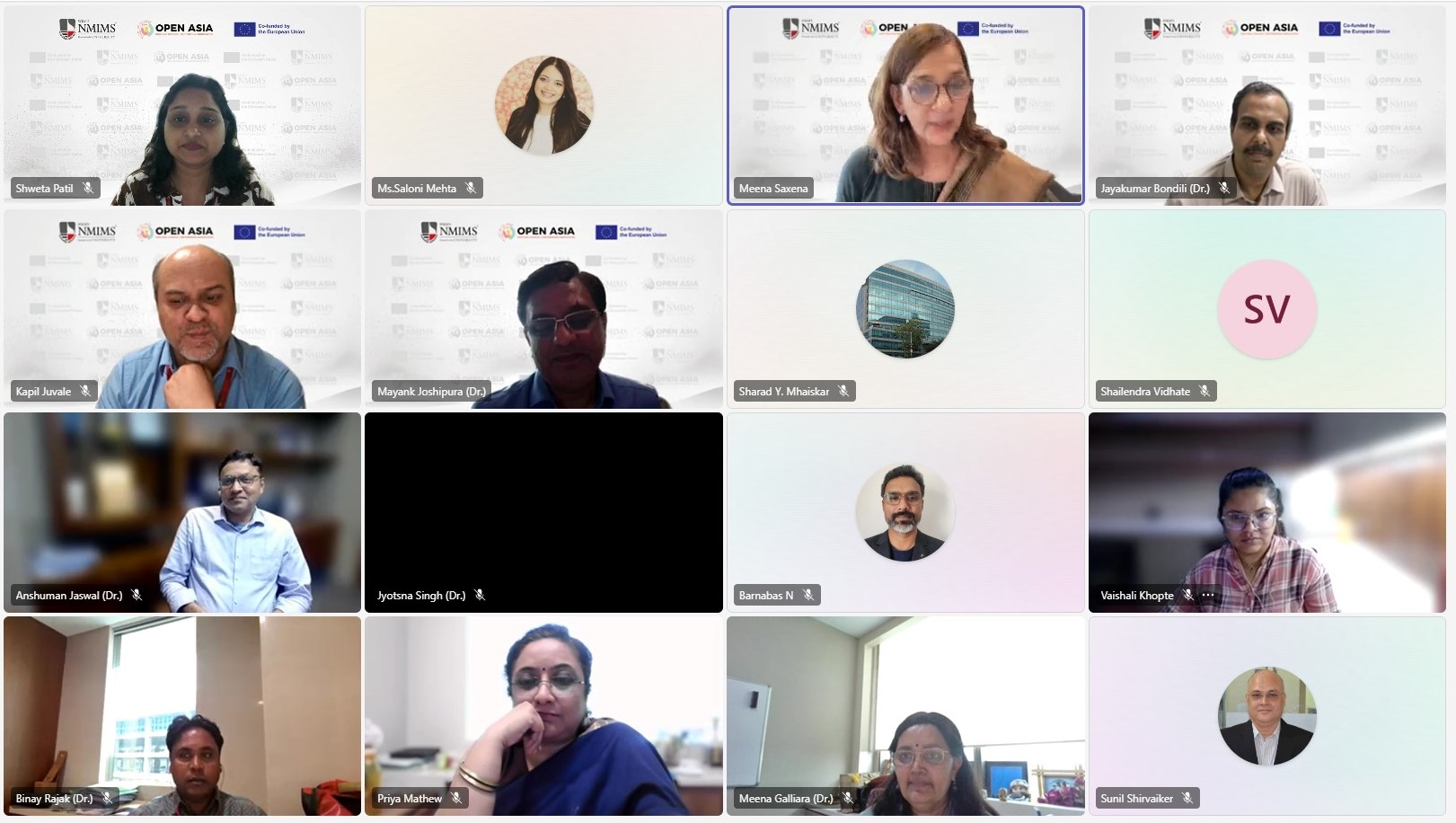
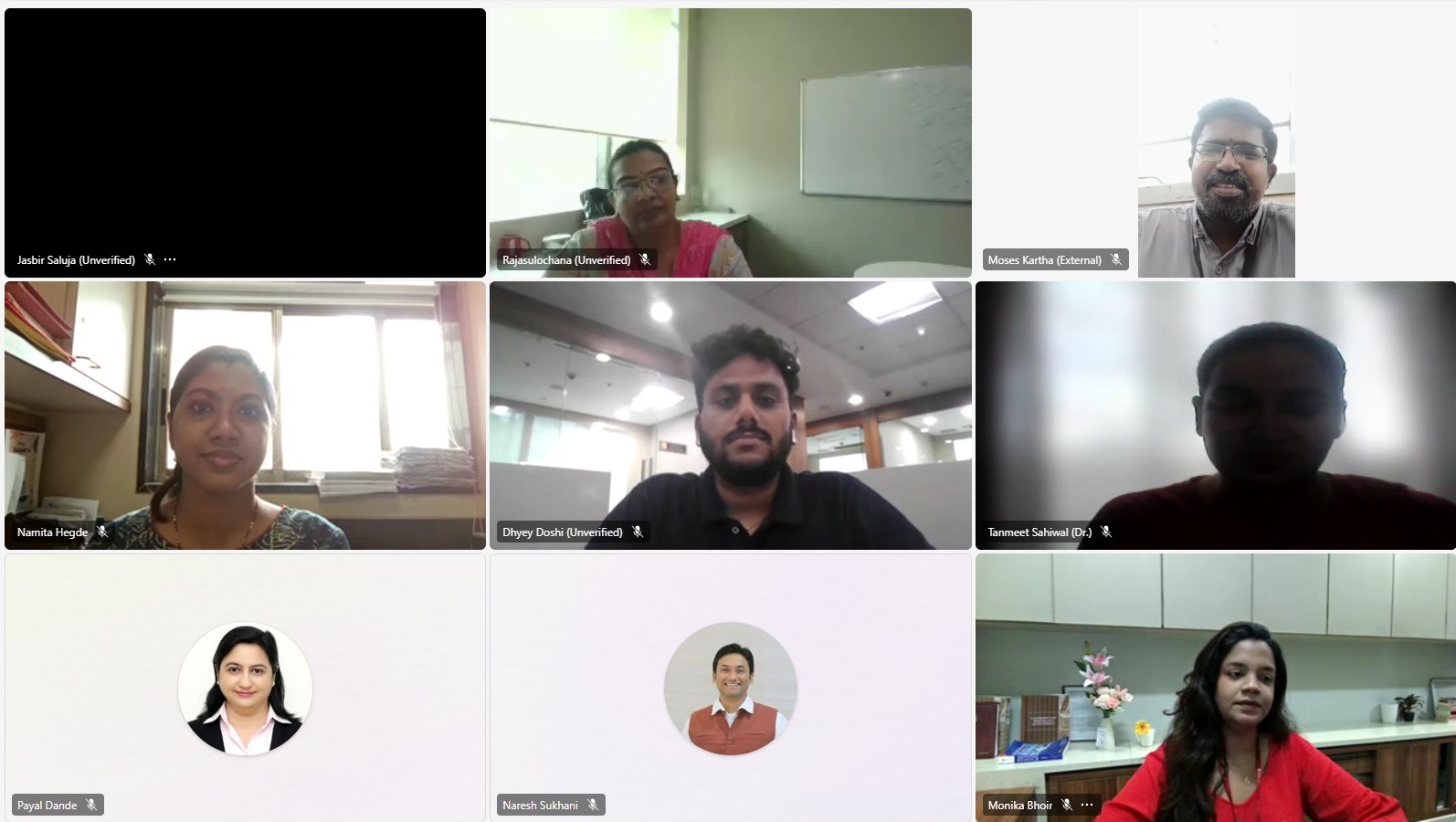
Advancing Open Science and Community Service Learning
Report on NMIMS's Engagement in EU Open Asia Project at VU University -Amsterdam, Netherlands
Project No. 101128493
Capacity Building Workshop 2
Dr. Mayank Joshipura (Associate Dean-Research, SBM, SVKM’s NMIMS) and Dr. Jayakumar Singh Bondili (Dean, SDSoS, SVKM’s NMIMS) participated in a Capacity Building Workshop hosted by Vrije University (VU), Amsterdam, Netherlands, from June 17th to 21st, 2024. The workshop was coordinated by Dr. Marjolein Zweekhorst (Professor, Faculty of Science, Athena Institute, VU) and Dr. Sarju Sing Rai (Assistant Professor, Faculty of Science, Athena Institute, VU).
The workshop, titled "Public Engagement via Science Shops and Community Service Learning," was part of the Erasmus+ OPEN-ASIA project, co-funded by the European Union’s Erasmus+ program. Participating institutions included SVKM’s NMIMS (India), the University of Malaya (Malaysia), University Malaysia Sabah (Malaysia), University Malaysia Sarawak (Malaysia), the International School for Social and Business Studies (Slovenia), and institutions from Botswana and Zambia involved in the OSCAR 2.0 project.
The five-day workshop centered around enhancing public engagement in science through initiatives such as science shops, community service learning, citizen science, and knowledge equity. The presence of African institutions participating in OSCAR 2.0 added depth to the discussions, allowing for an exchange of perspectives on open science initiatives across different regions.
Day 1: The workshop began with a welcome address by Dr. Jacqueline Broerse (Director, Athena Institute, VU) and Dr. Marjolein Zweekhorst, followed by brief presentations from participating institutions. Dr. Joshipura presented an overview of NMIMS University, highlighting its contributions to open science through initiatives like WeCare (Community Service Learning), the Shirpur Groundwater Recharge Project (Shirpur Pattern), and NMIMS’s open-access resources, including downloadable books and journals. The second half of the day featured a session on Science Shops, led by VU, where participants worked on developing a vision and implementation plan for Science Shops at their institutions.
Day 2: The day began with an in-depth presentation by VU on Science Shops, followed by presentations from participating institutions sharing best practices. In the afternoon, European universities shared their experiences with public engagement through community service learning. Notable presentations included those by Karsten Altenschmidt (UNIKTIV, Germany), Geertje Tijsma (VU, Netherlands), Nataša Matulayová (UPOL, Czech Republic), and Avril Lombardi Bolaño & Janaina de Oliveira (URV, Spain).
Day 3: The focus was on the role of libraries in open science. VU Library presented, followed by a visit to a public library where participants engaged in the “Science with Society Festival,” which facilitated conversations between citizens, students, scientists, community partners, and policymakers. Dr. Joshipura participated in discussions on “Energy Transition,” while Dr. Bondili contributed to conversations on “Mental Health.”
Day 4: The Knowledge Equity Symposium featured expert presentations and panel discussions on Knowledge Equity in Education and Research. Dr. Cees Hamelink (Professor Emeritus, VU) delivered the keynote address on knowledge equity, followed by contributions from Dr. Pius Mosima (Cameroon), Sandra Hasanefendic (VU), Natasa Matulayova (Czechia), and Dr. Clement Niyerenda (South Africa). Dr. Bondili also served as a panelist, participating alongside OSCAR 2.0 and Open Asia project representatives. The day concluded with a discussion on the role of libraries in knowledge equity, featuring insights from Hilde van Wijngaarden (VU), Masud Kokhar (Leeds), and Shirlene Neerputh (UWC).
Day 5: The final day focused on developing institutional science shop plans. Dr. Joshipura and Dr. Bondili presented NMIMS’s plan to enhance the WeCare program by adopting a transdisciplinary approach, aiming to establish research clusters focused on addressing pressing issues in business, society, and the environment. The workshop concluded with student poster presentations on Science Shop projects.
In addition to the workshop activities, VU organized a forest walk (June 17th), a boat tour of the city (June 19th), and an interactive play at the public library (June 20th), offering opportunities for networking and informal interactions.
The five-day workshop underscored the importance of public engagement through initiatives such as Science Shops, community service learning, knowledge equity, and the pivotal role of libraries. Valuable connections were established with institutions from the Open Asia and OSCAR 2.0 projects, as well as European experts. These partnerships are expected to support NMIMS in areas like data management, community service learning, open science, interdisciplinary course development, and international Ph.D. recruitment.
Dr. Mayank Joshipura and Dr. Jayakumar Bondili have joined the Knowledge Equity Network individually. They have initiated steps to incorporate data management plans in university policies, including in the University Ethics Code and Ph.D. coursework on “Research and Publication Ethics.”
Original Writeup Dr. Mayank Joshipura (Associate Dean-Research, SBM, SVKM’s NMIMS,) and Dr. Jayakumar Singh Bondili (Dean, SDSoS, SVKM’s NMIMS) participated in the capacity building workshop conducted by Virje University (VU), Amsterdam, Netherlands from 17th to 21st June, 2024. The workshop was coordinated by Dr. Marjolein Zweekhorst (Professor, Faculty of Science, Athena Institute, VU) and Dr. Sarju Sing Rai (Assistant Professor, Faculty of Science, Athena Institute, VU).
The capacity building workshop 1 (CBW2) focused on “Public Engagement via Science Shop and Community Service Learning" was organized as a part of the OPEN-ASIA project co-funded by the Erasmus+ programme of the European Union. The participating organizations included SVKM’s NMIMS (India), University of Malaya (Malaysia), University Malaysia Sabah (Malaysia), University Malaysia Sarawak (Malaysia), International School for Social and Business Studies (Slovenia) and institutions from Botswana and Zambia from OSCAR 2.0 project.
The five-day workshop focused on major theme of enhancing public engagement in science including science shops, community service learning, citizen science and knowledge equity. The quality of discussions was enhanced by participation of African institutions under OSCAR 2.0 institutions as it helped understand the open science initiatives and progress in Africa.
1st day kick-started by welcome address by Dr. Jacqueline Broerse (Drector, Athena Institute, VU) and Dr. Marjolein Zweekhorst followed by brief presentations from participating institutions. Dr. Joshipura made presentation on NMIMS University and highlighted the University’s contributions toward open science focusing on WeCare (Community Service Learning), Ground water recharge project in Shirpur (Shirpur Pattern), open science knowledge shared by NMIMS in form of downloadable books and open access journal. The 2nd half focused on the Science Shop presentation by VU and workshop on science shop to build institutional vision and implementation of science shop at participating institutions.
2nd day started with presentation on Science Shop by VU followed by presentations from participating institutions and to learn from best practices from other institutions. The 2nd half included presentations from European Universities on International learning lab, sharing their experiences on public engagement through community service learning including. Karsten Altenschmidt,(UNIKTIV, Germany), Geertje Tijsma (VU, Netherlands), Nataša Matulayová (UPOL, Czech Republic), Avril Lombardi Bolaño & Janaina de Oliveir (URV, Spain).
3rd day focused on role of libraries in open science with presentation by VU library and the 2nd half the participants visited public library to participate in “Science with Society Festival” fousing on conversations between citizens, students, scientists, community partners and policy makers. Dr. Joshipura participated in “energy transition’ whereas Dr. Bondili participated in “mental health” conversations.
4th day was dedicated to Knowledge Equity Symposium with presentations by experts and series of panel discussion on Knowledge Equity in Education and research. It started with informal welcome by Marjolein Zweekhorst and Sander Bosch followed by formal welcome speech by Miranda van Holland (VU). Dr. Cees Hamelink, Professor Emirates (VU) delivered keynote address on Knowledge equity. Dr Pius Mosima (Cameroon) , Sandra Hasanefendic (VU), Natasa Matulayova (Czechia), Dr Clement Dr Niyerenda (South Africa) shared their experiences on knowledge equity and research followed by short presentations by Victor de Boer (VU), Amrita Das (VU), Michele Meijer (VU), Prof Maurice Crul (VU). Dr. Masood (Leeds) presented Knowledge Equity network followed by panel discussion on Role of Libraries in Koowledge Equity including Hilde van Wijngaarden (VU), Masud Kokhar (Leeds), Shirlene Neerputh (UWC) as panellists. Dr. Bondili participated as a panelist one of the panel discussions on Knowledge Equity along with participants from three other participants from OSCAR 2.0 and Open Asia project institutions.
5th day started with institutional science shop plans. Dr. Joshipura and Dr. Bondili presented plan to build upon Wecare (community service engagement) and make it interdisciplinary, focusing on transdisciplinary approach to research focusing on transdisciplinary research units/clusters focusing on issues facing business, society and environment. The 2nd half was about students’ poster presentations on science shop projects.
Beside the workshop, VU arranged for a forest walk (17th evening), boat city tour (19th evening) and interactive play at public library (20th afternoon) which offered networking opportunity and informal interactions.
Overall the five-day workshop focused on open engagement of social actors through initiatives such as science shops, community service learning, knowledge equity and role of libraries. We established connections with participating institutions from Open Asia, OSCAR 2.0 and speakers from European region. These connections will help us setting up data management plan and data repository, exchanging best practices in community service learning and open science, offering interdisciplinary course linked to community service learning with the help of VU in select schools such as School of Science, attracting international Ph.D. students and fostering research collaborations. Dr. Mayank Joshipura and Dr. Jayakumar have already joined Knowledge Equity Network in their individual capacity and identifying research units for cluster based research and incorporating data management plan for faculty and doctoral scholars is iniatiated and it is included in University Ethics code as well as Ph.D. programme course work in subject titled “Research and Publication Ethics”.
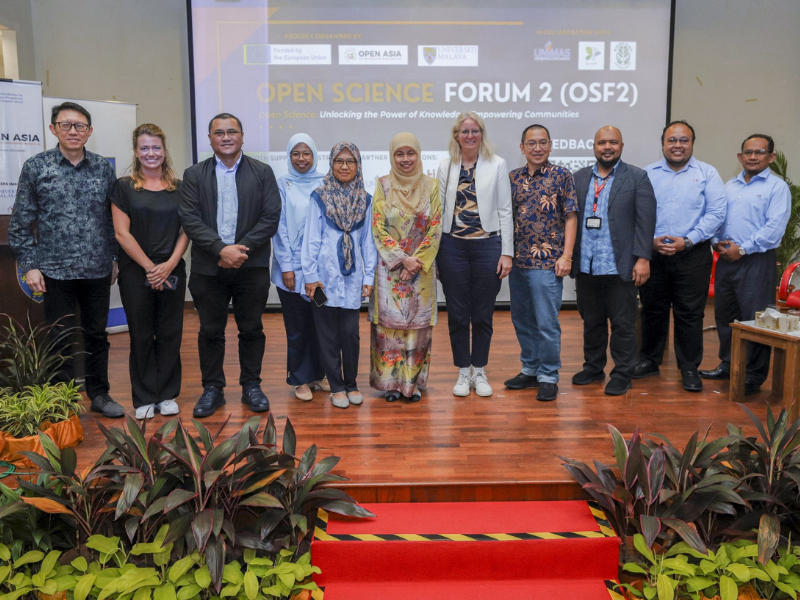
The EU Open Science Forum 2 (OSF2), hosted by University of Malaya, focused on "Unlocking the Power of Knowledge, Empowering Communities." This forum took place over two days, October 23-24, 2024, gathering scholars, policymakers, and innovators to discuss open science implementation, especially in academic institutions across Asia and Europe. From NMIMS, Dr. Jayakumar Singh Bondili Dean NMIMS School of Science, Dr. Archana Bhise Associate Dean – Research and Development NMIMS School of Engineering and Dr. Yogesh Kulkarni Professor NMIMS School of Pharmacy participated in the forum.
Day 1 (October 23, 2024) Highlights
The forum began with a keynote by Puan Hazami Habib, CEO of the Academy of Sciences Malaysia. Her speech highlighted how open innovation drives scientific advancements and the role of open science in making knowledge accessible to broader communities. She also presented the initiatives taken by various Academic Institutions to promote and implement open science policies.
Session included experts from India, Dr Yogesh Kulkarni (NMIMS, India), Dr Jaswinder Singh Saini (Thapar Institute of Engineering and Technology, India), Dr Ainuddin Wahid Abdul Wahab (Universiti Malaya, Malaysia) and Dr Ag Asri Ag Ibrahim (Universiti Malaysia Sabah, Malaysia). Experts discussed the unique challenges and successes of implementing open science in Asian institutions. The session was moderated by Dr. Abrizah Abdullah from Universiti Malaya. Panelists emphasized creating shared platforms for knowledge and data exchange and improving collaboration across borders to accelerate research output.
Dr Dr. Shaliza Ibrahim moderated this session. It featured experts from the Netherlands, Finland, and Slovenia. Panelists were Dr Marjolein Zweekhorst (VU, Netherlands), Dr Jussi Aleksi Kivistö (Tampere University, Finland), Dr Valerij Dermol (International School for Social and Business Studies, Slovenia) and EPDRI, Slovenia. Discussions focused on the impact of open science policies in Europe, particularly in enhancing research transparency, data accessibility, and fostering innovation. Panelists also spoke about obstacles, such as legal restrictions and funding limitations, and shared strategies for overcoming these issues through partnerships and policy reforms.
Session was moderated by Dr. Liew Chee Sun from Universiti Malaya. The session focused on the importance of data interoperability in open science. Prof. Dr. Barend Mons (Leiden University) highlighted the need for standardized protocols and data-sharing platforms that enable seamless collaboration among researchers, promoting transparency and reuse of scientific data.
The session was led by Dr. Zeeda Fatimah Mohamad. Speakers were Dr Muhd Zulfadli Hafiz Ismail (National Institute of Health, Malaysia), Dr Nurzatil Sharleeza Mat Jalaluddin (Universiti Malaya, Biodiversity), Dr Mohd Fadzil Firdzaus Mohd Nor (Universiti Malaya, Climate Research) and Dr Raha Abdul Rahim (FASc, MyGenome Initiative). This session featured domain experts discussing data-sharing practices in fields like public health, biodiversity, climate research, and genomics. Each speaker shared case studies and models for successful data sharing, demonstrating how these practices can improve research outcomes in specific scientific fields.
Day 2 (October 24, 2024) Highlights
The second day of the meeting began on a vibrant and culturally rich note, with a display of traditional music and dance. The day commenced with an enchanting performance by a talented musician playing the Sape, a traditional lute. The Sape, with its resonant tones, created a peaceful and mesmerizing atmosphere. It reflected the indigenous history and musical heritage of Malaysia.
Following the Sape performance, a group of young women took the stage to perform a traditional Malaysian folk dance. Dressed in vibrant, culturally significant attire, the dancers brought energy and elegance, showcasing the grace and rhythmic beauty of Malaysian dance traditions.
Day 2 introduced interactive workshops, starting with Citizen Science and Open Dialogue sessions. The workshops, chaired by Prof. Dr. Kiran Kaur Gurmit Singh and Prof. Dr. Rosli Ramli. Speaker were Mr Kelvin Egay John (Universiti Malaysia Sarawak), Dr Hanafi Hussin (IOES, Universiti Malaya), Dr Zeeda Fatimah Mohamad (Universiti Malaya), Mr Wan Faizah Che Din (Amanah Lestari Alam), Ms Lara Ariffin (RIMAU) and Ms Muniratul Husna Mohamad Zaki (UiTM Jengka). They explored how engaging local communities in scientific research can make science more inclusive and impactful. Participants discussed ways to bridge traditional knowledge systems with modern science, facilitating a two-way knowledge exchange that respects cultural heritage.
AP Dr. Nur Azah Hamzaid chaired this session. Session focused on the development and distribution of Open Educational Resources. Speakers of the session were Dr Fong Soon Fook (Universiti Malaysia Sabah) and Dr Abdullah Al-Hadi Ahmad Fuaad (Universiti Malaya). This workshop highlighted the potential of OER to democratize education, making high-quality learning materials freely accessible to students and educators worldwide.
The forum concluded with discussions on ‘AI for data sharing’ and ‘legal aspects of open science’. The session was chaired by Dr. Noorsaadah Abd Rahman. Dr. Aida Mustapha and Dr. Hong Xue shared insights on how AI can enhance data processing and sharing, while addressing the ethical and legal considerations of open science implementation. This session emphasized the need for regulatory frameworks that balance openness with privacy and intellectual property protections.
Key Themes and Takeaways
The OSF2 provided a platform for sharing best practices, discussing policy approaches, and developing frameworks to advance open science globally.
EU Open Sciece project institutions Vrije Universiteit Amsterdam (VU Amsterdam), Tampere University, International School for Social and Business Studies (ISSBS), European Policy Development and Research Institute (EPDRI), Thapar Institute of Engineering and Technology, NMIMS University, Universiti Malaya, Universiti Malaysia Sarawak & Universiti Malaysia Sabah participated in the two-day Forum
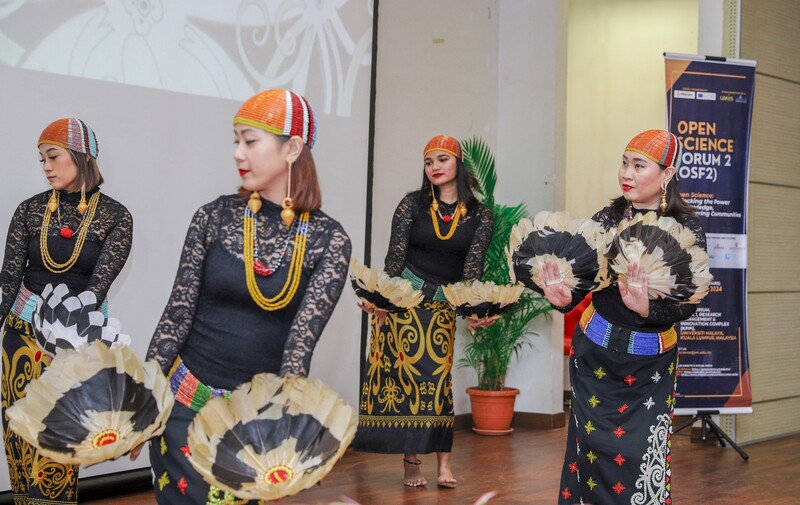
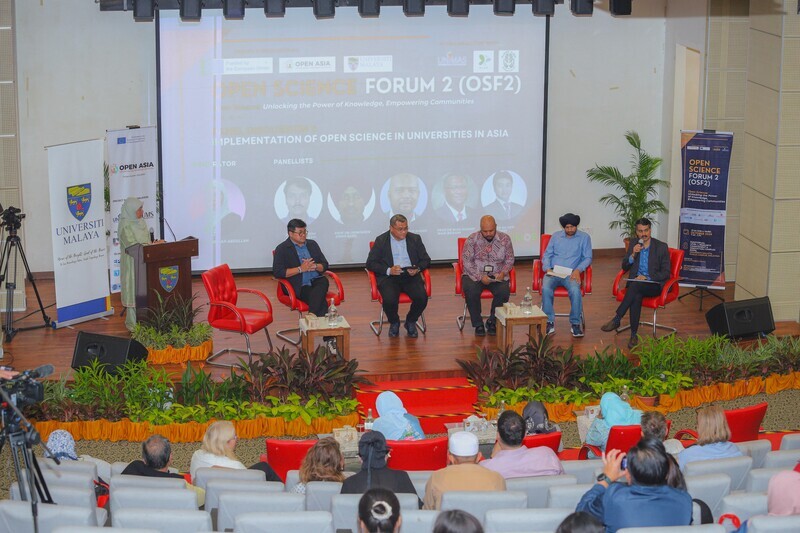
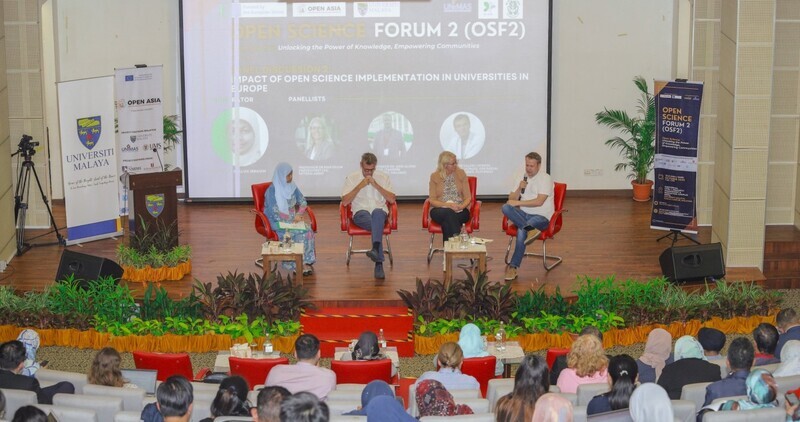
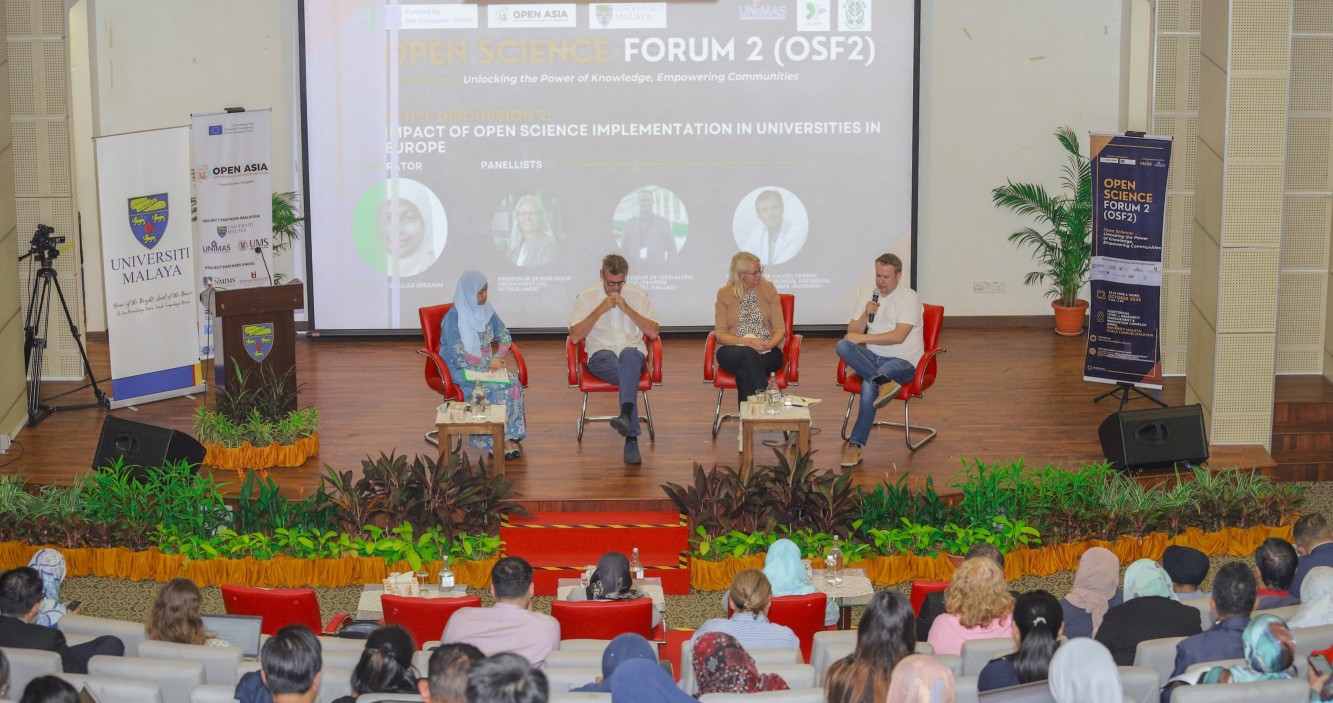
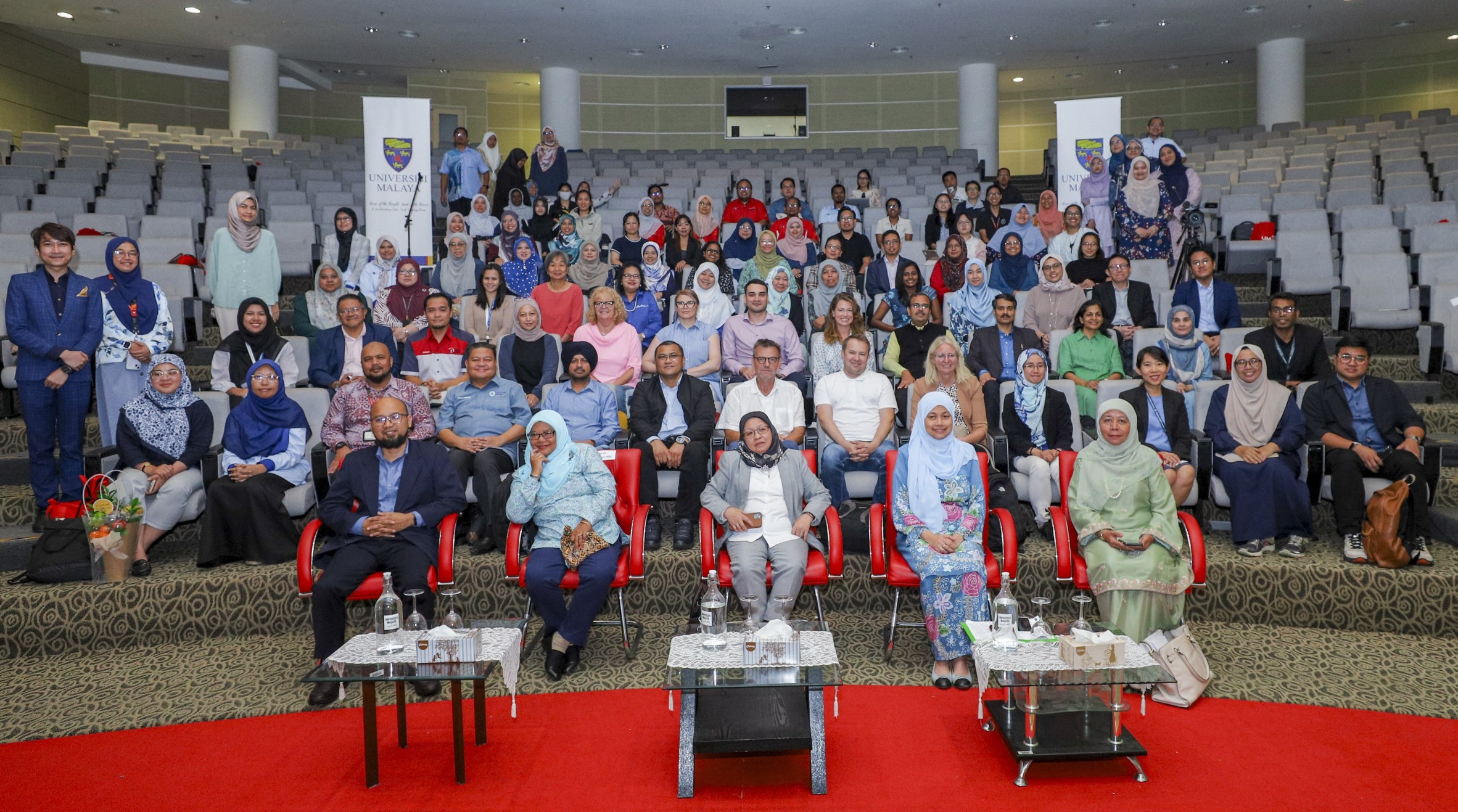

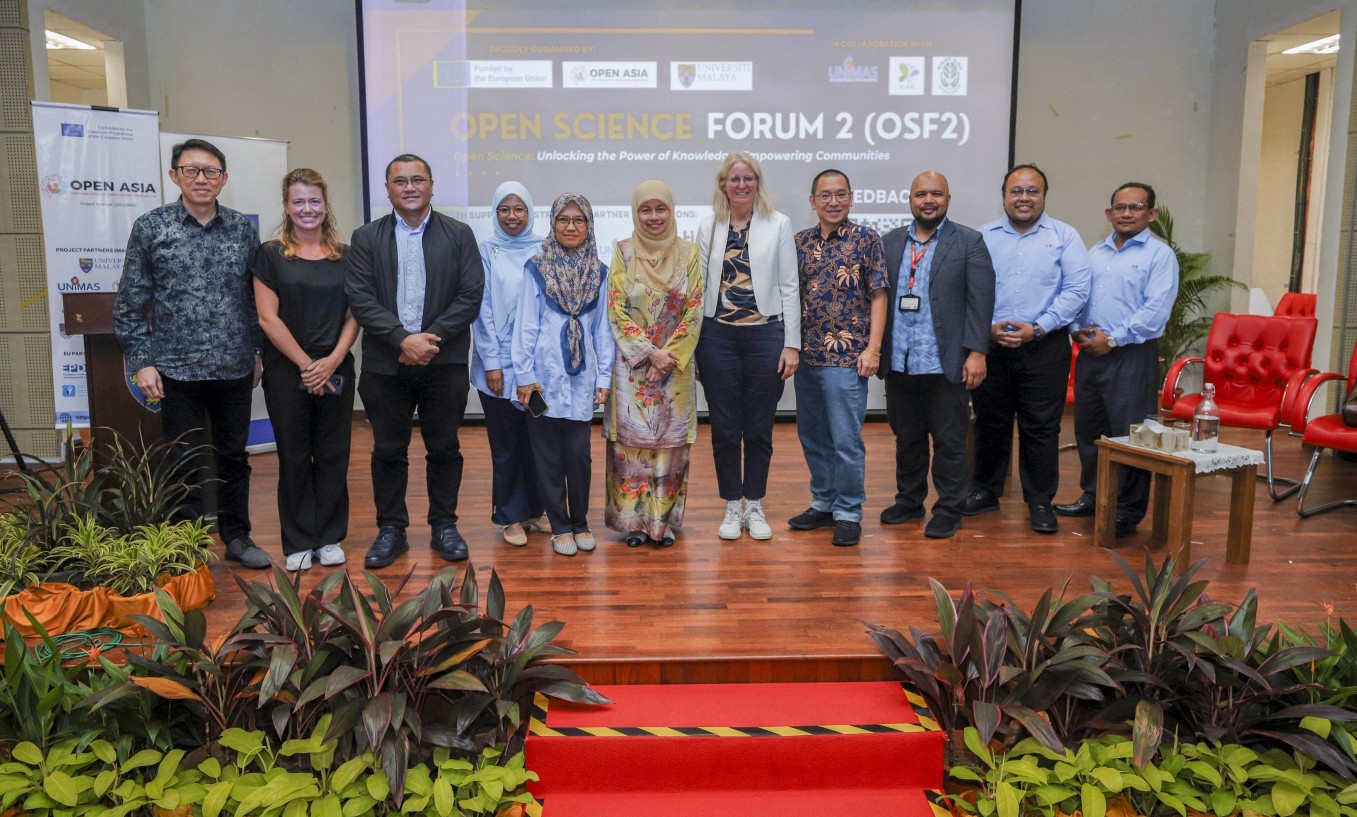
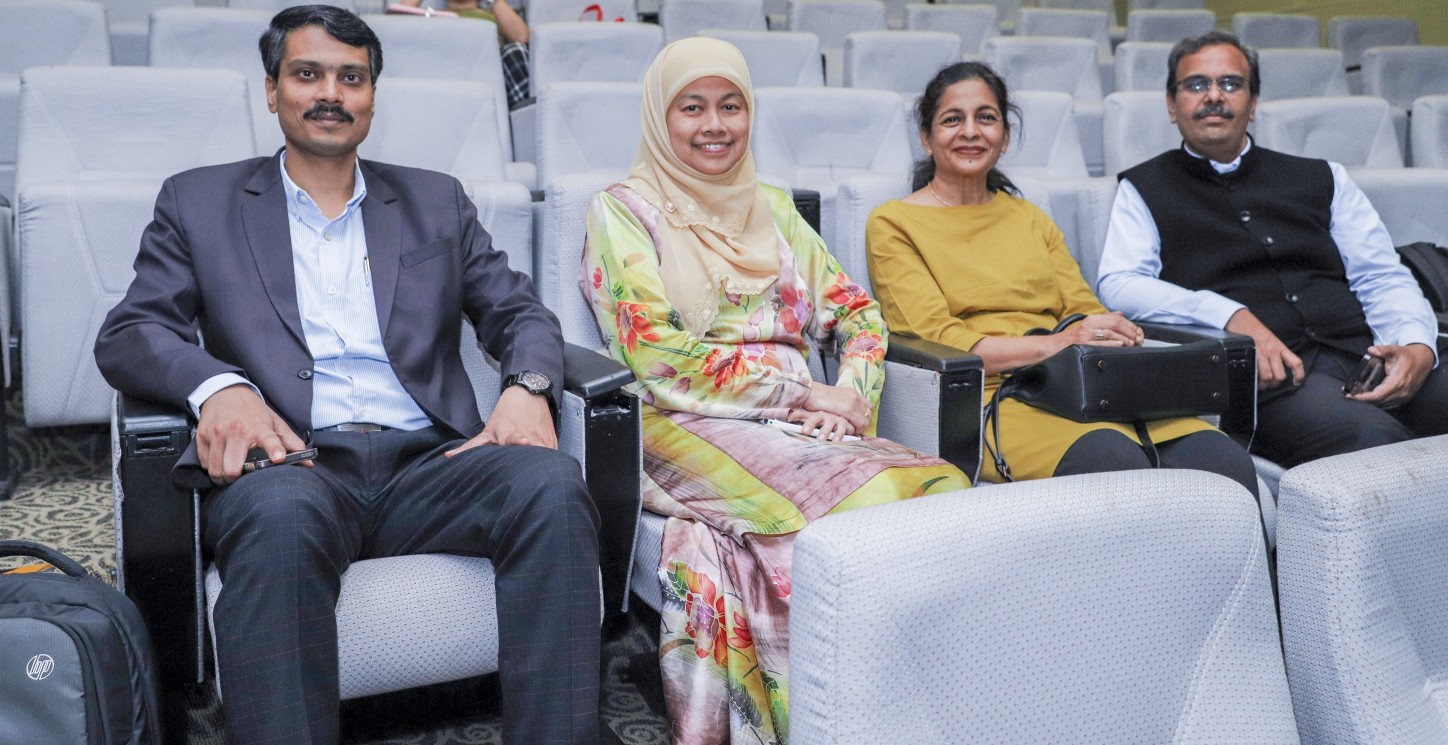
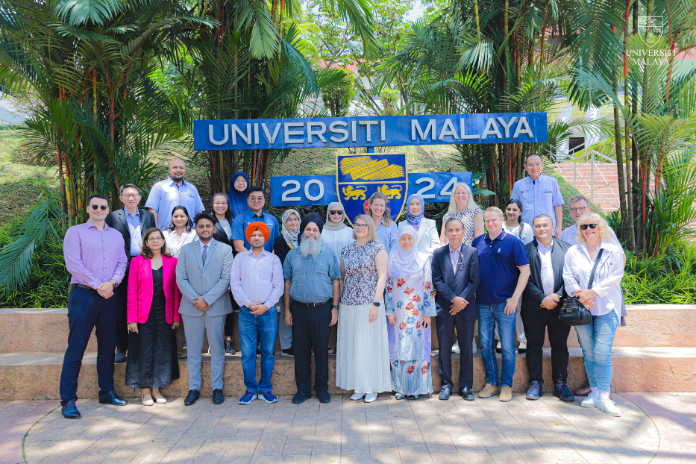
Project No. 101128493
The NMIMS Open Asia Administrative team comprising of Ms. Meena Saxena – Director & Ms. Shweta Patil Manager, both from Department of International Linkages and Mr. Dhyey Doshi -Dy Finance Manager recently participated in the EU Second Consortium Meeting of the "Open ASIA: Boosting Engagement of HEIs in Open Science in India and Malaysia" .The Project meeting was hosted by Universiti Malaya in Kuala Lumpur, Malaysia on 21st & 22nd October. Duration of the project –January 2024 – January 2027.
25+ Participants from Vrije Universiteit Amsterdam (VU Amsterdam), Tampere University, International School for Social and Business Studies (ISSBS), European Policy Development and Research Institute (EPDRI), Thapar Institute of Engineering and Technology, NMIMS, Universiti Malaya, Universiti Malaysia Sarawak & Universiti Malaysia Sabah participated in the project meeting.
Day 1: Monday, 21 October 2024
The first day focused on reviewing the progress of the Open ASIA project, along with updates from the involved organizations. Key discussions covered:
Day 2: Tuesday, 22 October 2024
The second day Project Co- Coordinator Dr. Olesea Sirbu addressed the project’s financial and quality metrics, ensuring strong outcomes and sustainable impact. Key topics included:
Dr. Sadlapur, Head Dept. of Library & Information Science virtually presented an overview of the Proposed NMIMS International Conference on Open Science in May 2025 with the objective of getting support from the project partners toward expert speakers and submission of research papers.
Universiti Malaya organised a Cultural Visit to the Museum of Asian Art, located on the main campus. The museum aims to foster an appreciation of Asian art among Malaysia’s diverse communities and houses nearly 7,000 artifacts representing cultures from across Asia, spanning 4,000 years of history. In its 1,500-square-foot gallery space, the museum showcases the artistic, cultural, and intellectual heritage of Asia, including Chinese pottery, Hindu sculptures, textiles from the Malaya archipelago, and sacred masks from the Orang Asli communities.
Additionally, Universiti Malaya organized a Visit to Art Exhibition titled “Visionary Journeys Art Exhibition,” running from 14 October to 14 November 2024. The exhibition, a collaborative effort between the University of Malaya Art Gallery (UMAG), Hear2Art exhibitors, and the Malaysian Association for the Blind (MAB), raises funds to support MAB. The exhibition features various art genres, including vibrant floral scenes, landscapes, abstract works, and intricate bird-themed artworks, some of which were created by visually impaired students.
The meeting marked an important step in fortifying Open Science practices in the region, fostering collaborations that aim for sustained academic and research excellence.
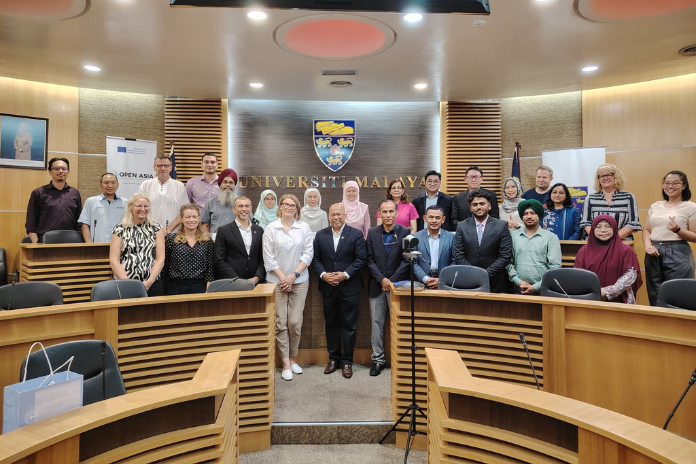
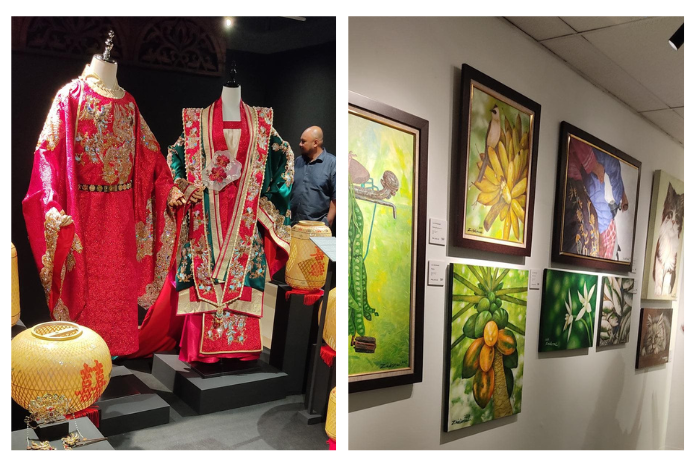
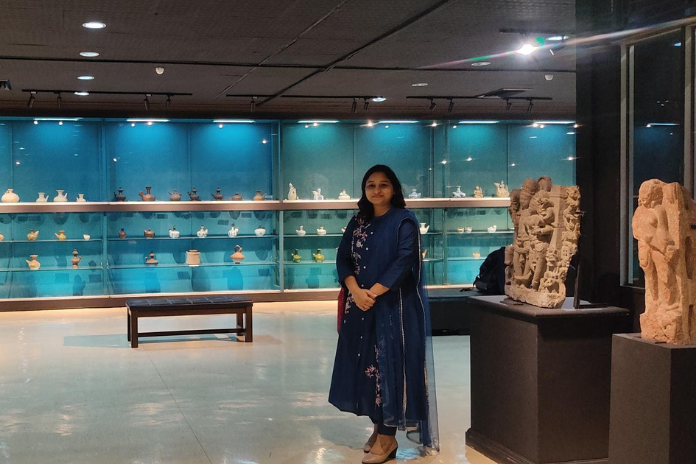
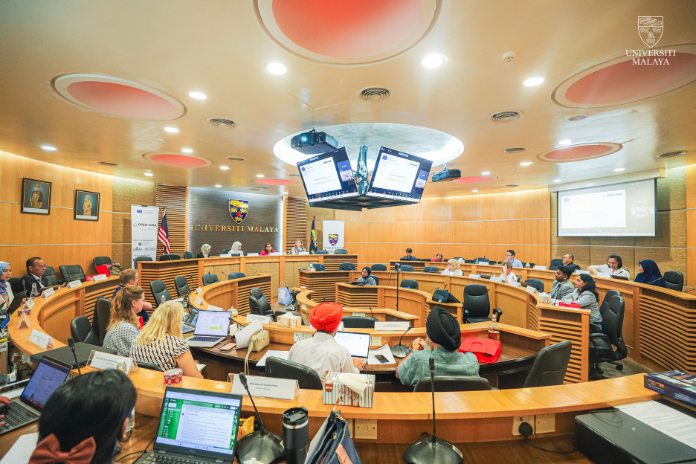
.png)
Mumbai, India, March (date), 2024 – SVKM’s NMIMS Deemed-to-be-University hosted a conference on Open Science held under the aegis of the ERASMUS Open Asia-Boosting engagements in higher education institutes in Open Science in India and Malaysia, in collaboration with leading universities from across the world. The consortium meeting for the partner schools took place on March 19 and 20, 2024, followed by the International Conference on Open Science on March 21 and 22, 2024 at NMIMS Mumbai.
The partner universities for the Open Asia ERASMUS Project included Thapar Institute of Engineering and Technology, India; University of Tampere, Finland; VU Amsterdam University, Netherlands; University of Malaya, University of Malaysia Sabah & University of Malaysia Sarawak- all from Malaysia; International School for Social and Business Studies and European Policy Development & Research Institute both from Slovenia.
Dr. Ramesh Bhat, Vice Chancellor of NMIMS was the Convenor of the conference, and Dr. Sharad Mhaiskar, Pro Vice Chancellor of NMIMS, and Dr. Olesea Sirbu, Vice-rector for International Relations at the Academy of Economic Studies of Moldova, served as the Co-Convenors. Meena Saxena, Director, International Linkages NMIMS University, is the ERASMUS Open Asia, Project Coordinator.
Extending a warm welcome to all the dignitaries, Dr. Ramesh Bhat, said, “The Open Science Forum is vital for researchers in tackling the problem of biased journal publications. About 60-70% of research faces hurdles in getting published due to this bias. With this forum, researchers can openly discuss their hypotheses, avoiding wasted time on unproductive topics. These interventions will promote open science and promote a positive shift in research culture. NMIMS is fully committed to embracing the OSF framework to drive forward a culture of open science and innovation.”
The two-day conference saw participants take part in discussions on various aspects of Open Science, including the Open Science experience across various countries, national policy development, community engagement, the significance of artificial intelligence in Open Science, commercial and open-source software, data-sharing, and open-access publishing.
Dr. Man Mohan Sharma, Emeritus Professor of Eminence, Institute of Chemical Technology, was the Chief Guest at the conference. Sharing a unique perspective, Dr. Sharma, said, “In universities, we have what is called spiritual freedom to pursue ideas. Research, contrary to normal belief, is unstructured because you don’t know the result. Open science encourages curiosity-driven research. It’s about trying new things without knowing the outcome. Failures are harbingers of success. If you want to do something original and you have that curiosity, how do you strike at a new idea? That treatment is not going to come without open science.”
Dr. Akhilesh Gupta, Senior Advisor, Department of Science and Technology (DST) and Former Secretary of the Science and Engineering Research Board (SERB) emphasised the importance of adopting an open science policy to create a vibrant environment through a vision for India’s Science, Technology and Innovation. He said this approach was crucial to align with the global transition from a closed to an open science world.
In an era marked by unprecedented technological advancements and complex societal challenges, the traditional paradigms of scientific research and knowledge dissemination are rapidly evolving. In India, the Open Science movement, symbolising the principles of transparency, collaboration, and accessibility crucial for addressing the intricate problems facing our world today, has begun to gain traction over the past few years. Open Access journals have proven pivotal in promoting Indian researchers in both, international and national databases, with central repositories boosting accessibility to scholarly publications.
According to Dr. Olesea Sirbu, “International collaboration is essential in advancing scientific research and ensuring its accessibility to all levels of society. This Open Science conference is an opportunity to strengthen ties between institutions and promote a culture of openness and inclusivity to encourage new opportunities for discovery and address global challenges in the field.”
Always at the forefront of emerging trends and innovation, faculty at SVKM’s NMIMS are actively involved in activities that support the implementation of open science, which includes collaborating on projects that align with the principles of open science, publishing in open-access journals, and utilising open-source software for research purposes.
Some faculty members of various schools and disciplines at SVKM’s NMIMS are working on research projects in compliance with the open science policy. For example, Dr. Kapil Juvale from the (SPPSPTM) is working in collaboration with the Drugs for Neglected Disease Initiative (DNDi), Geneva, to develop therapeutics for neglected diseases such as leishmaniasis.
Meanwhile, numerous faculty members at NMIMS publish their research in open-access journals, which enables immediate access to their work without any restrictions. The number of publications from NMIMS faculty in open-access journals has been rising of late.
At NMIMS, efforts are also on to transition from proprietary software to free open-source software. This is being done to support research, data management, and bibliography management. The Open Asia Project promotes Open Science principles among participating institutions, promoting transparency, collaboration, and innovation in scientific research. The conference, titled, ‘Unlocking Knowledge: A Conference on Open Science’, paved the way for a more inclusive and impactful scientific community throughout India by bringing scientists, researchers, and scholars together to explore the progressive potential of Open Science through discussions on project objectives, strategies, and future collaborations.
As part of the ERASMUS Open Asia Project, NMIMS signed a Memorandum of Understanding with the University of Tampere, Finland. The signing ceremony, which also marked the end of the event, took place on March 22, 2024, and proved to be a milestone in international academic cooperation.
.png)
.png)
ERASMUS+ project - OPEN-ASIA: Boosting engagement of HEIs in Open Science in India and Malaysia –Reference No 101128493.
Capacity Building Workshop
The OPEN-ASIA project is a collaborative effort aimed at fostering the digital economy and connectivity in India and Malaysia through the advancement of Open Science (OS) principles and values.
Ms. Meena Saxena (Director, International Linkages, SVKM’s NMIMS and OPEN-ASIA project coordinator) and Dr. Kapil Juvale (Asst. Prof., SPPSPTM, SVKM’s NMIMS) participated in the capacity building workshop conducted by Tampere University, Finland between 15th and 19th April 2024. The workshop was coordinated by Dr. Jussi Kivistö (Head of the Administrative Studies Unit, Faculty of Management and Business, Tampere University) and Kateryna Spurun (Researcher, Faculty of Management and Business, Tampere University).
The capacity building workshop 1 (CBW1): "Collaborative, Responsible and Open Science Infrastructure Development" was organized as a part of the OPEN-ASIA project co-funded by the Erasmus+ programme of the European Union. The participating organizations included SVKM’s NMIMS (India), Thapar Institute of Engineering & Technology (India), University of Malaya (Malaysia), University Malaysia Sabah (Malaysia), University Malaysia Sarawak (Malaysia), International

School for Social and Business Studies (Slovenia) and European Policy Development and Research Institute (Slovenia).
The five-day workshop organized by Tampere University focused on the creation of an open science (OS) infrastructure at participating institutes in Asia. The sessions conducted on day 1 and day 2 helped the participating institutes understand the implementation of open-science infrastructure in Finland, particularly at Tampere University. The sessions on day 1 included an introduction to the OS in Europe, OS
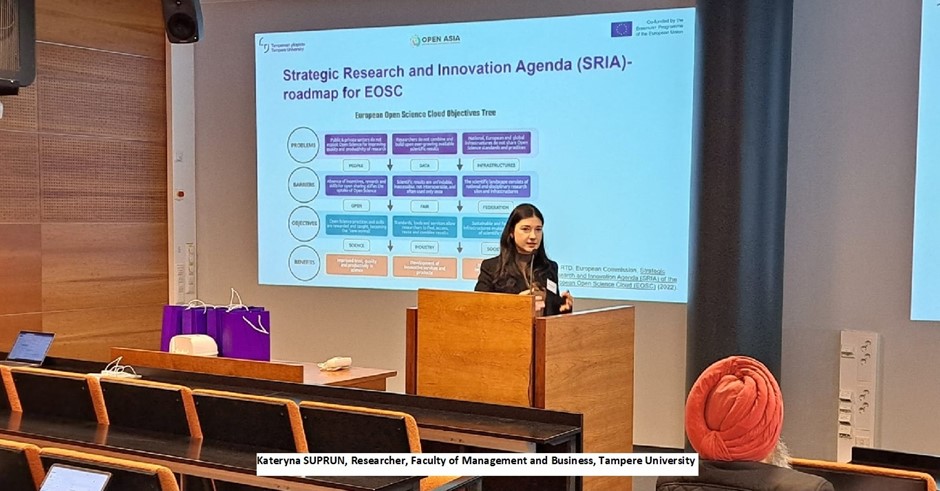
coordination in Finland, the role of the Center for Science (CSC) in OS infrastructure and OS at the Research Council of Finland. The day 2 sessions created awareness about the different OS policies, infrastructures and services available nationally in Finland and at Tampere University. Some of the OS infrastructure available included research information systems, open institutional and national repositories, and open-access support funding, among others.

Day 3 of the workshop started with interaction with MARIHE (Erasmus Mundus) students and deliberation on OS infrastructure. This highly interactive session was carried out by creating country-wise groups with MARIHE students to discuss potential OS infrastructure that could be implemented in that country. On day 4 and day 5, every participating institute deliberated on the potential OS infrastructure creation at their institute. In this collaborative workshop, every institute presented the current status of the OS infrastructure and plan for further development. Each participating institute created a plan with a timeline for its implementation while taking learnings from other institutes. For SVKM's NMIMS, Dr. Kapil presented the institutional plan for the creation of potential OS infrastructures at the institute. This included the creation of a research information system and repository for facilitating data sharing and fostering interdisciplinary collaboration and a library of open educational resources to provide unrestricted access to students.
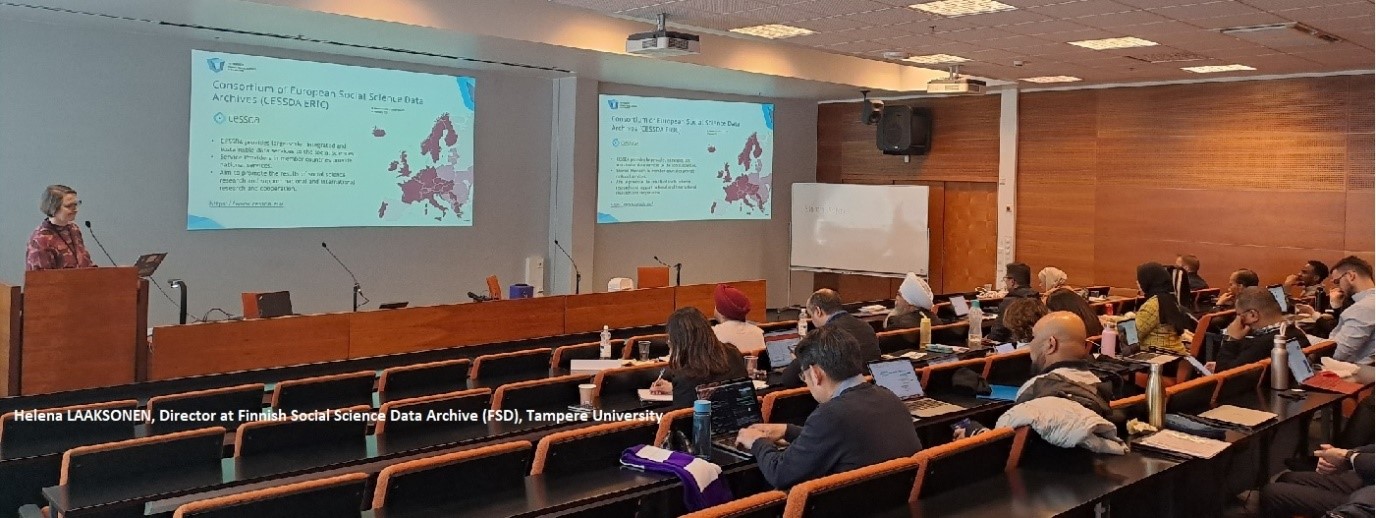

Overall, the capacity-building workshop provided an excellent platform for gathering experiences from leading OS institutes and the ones progressing in its implementation. The five-day workshop ended with the distribution of the certificates by Dr Jussi Kivistö

(Head of Administrative Studies Unit, Faculty of Management and Business, Tampere University).